Fashion brands leave their sartorial mark on Salone del Mobile 2019
The fashion set is more than familiar with Salone del Mobile by now. Beyond branching out into the odd furniture collections, dabbing a toe into the world of dynamic window displays and throwing a fancy cocktail party to celebrate (though, there’s plenty Aperol to be had) many of the luxury labels are turning out with fully-fledged creative collaboration with the art and design world’s top talents. See Cos, who enlisted Burning Man architect Arthur Mamou-Mani for its installation-cum-pavillion; Rimowa has teamed up with Spanish designer Guillermo Santomá and Bvlgari has commissioned Argentine artist and Wallpaper* Guest Editor Tomás Saraceno – and that’s just the start. Here is the Wallpaper* edit of the finest fashion findings to be seen at Salone del Mobile 2019
Receive our daily digest of inspiration, escapism and design stories from around the world direct to your inbox.
You are now subscribed
Your newsletter sign-up was successful
Want to add more newsletters?

Daily (Mon-Sun)
Daily Digest
Sign up for global news and reviews, a Wallpaper* take on architecture, design, art & culture, fashion & beauty, travel, tech, watches & jewellery and more.

Monthly, coming soon
The Rundown
A design-minded take on the world of style from Wallpaper* fashion features editor Jack Moss, from global runway shows to insider news and emerging trends.

Monthly, coming soon
The Design File
A closer look at the people and places shaping design, from inspiring interiors to exceptional products, in an expert edit by Wallpaper* global design director Hugo Macdonald.
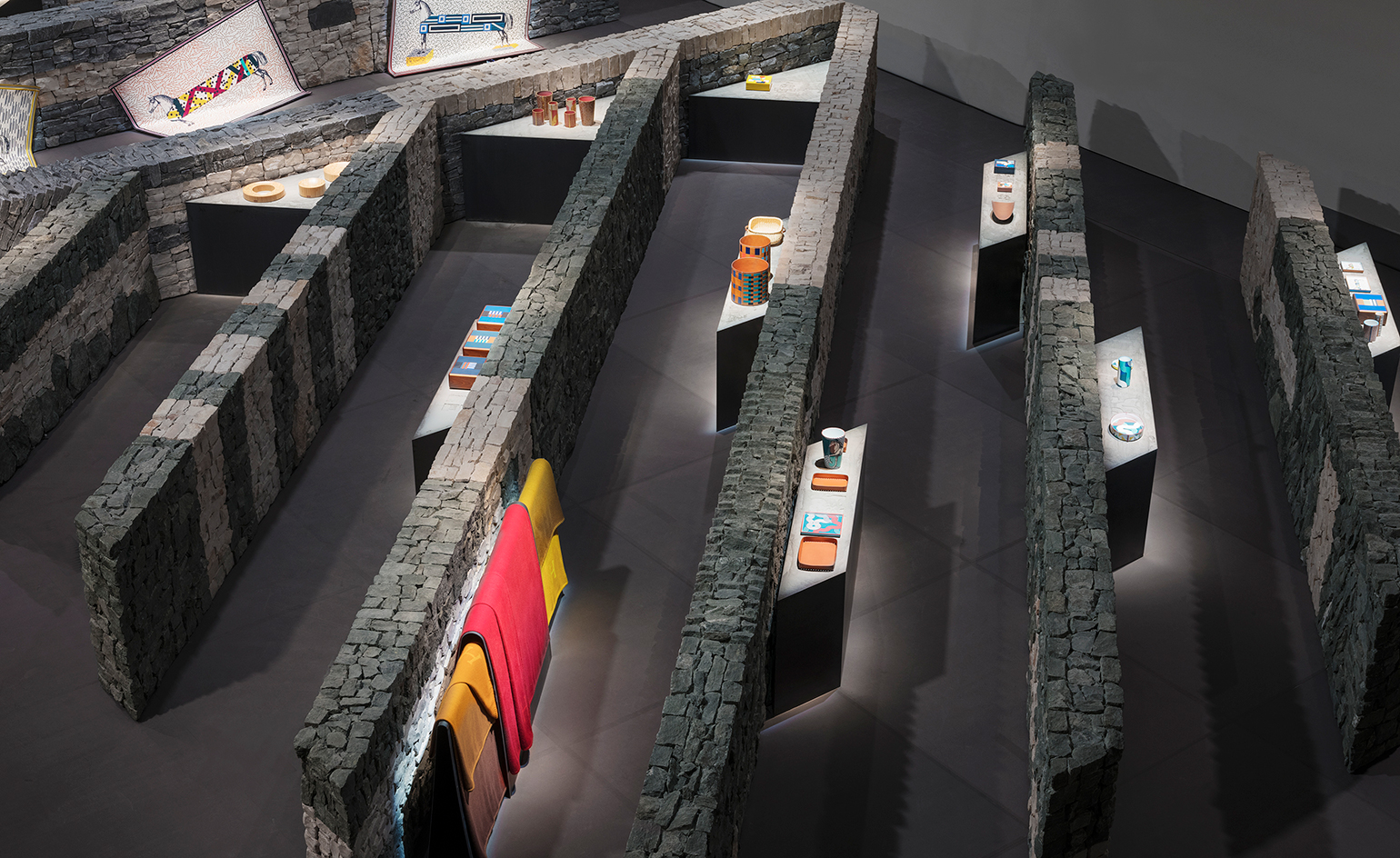
Hermès: Where Charlotte Macaux Perelman’s previous sets employed towering structures and solid walls to create pockets of space and hidden rooms, this year she’s opted for a smaller yet equally intriguing scale. Back at La Pelota, this year Hermès made the most of the space with uncharacteristically low walls, made from dry stone. The labyrinth-like space effectively guides visitors around, building anticipation as you can just about see what lies around the next corner. Displayed amongst the nooks and crannies is the new homeware collection, which celebrates materials. Tomás Alonso’s ethereal lamps strike a poetic balance between bamboo, paper and aluminium, while Barber & Osgerby’s intense black and white Halo and Hécate lights, crafted from granite and porcelain respectively, are pleasingly hefty. Joséphine Ciaudo was inspired by the silk jackets worn by jockeys, playing with the bright colours and contrasting patterns, crafting them in leather marquetry to create the most sublime of mahogany boxes.
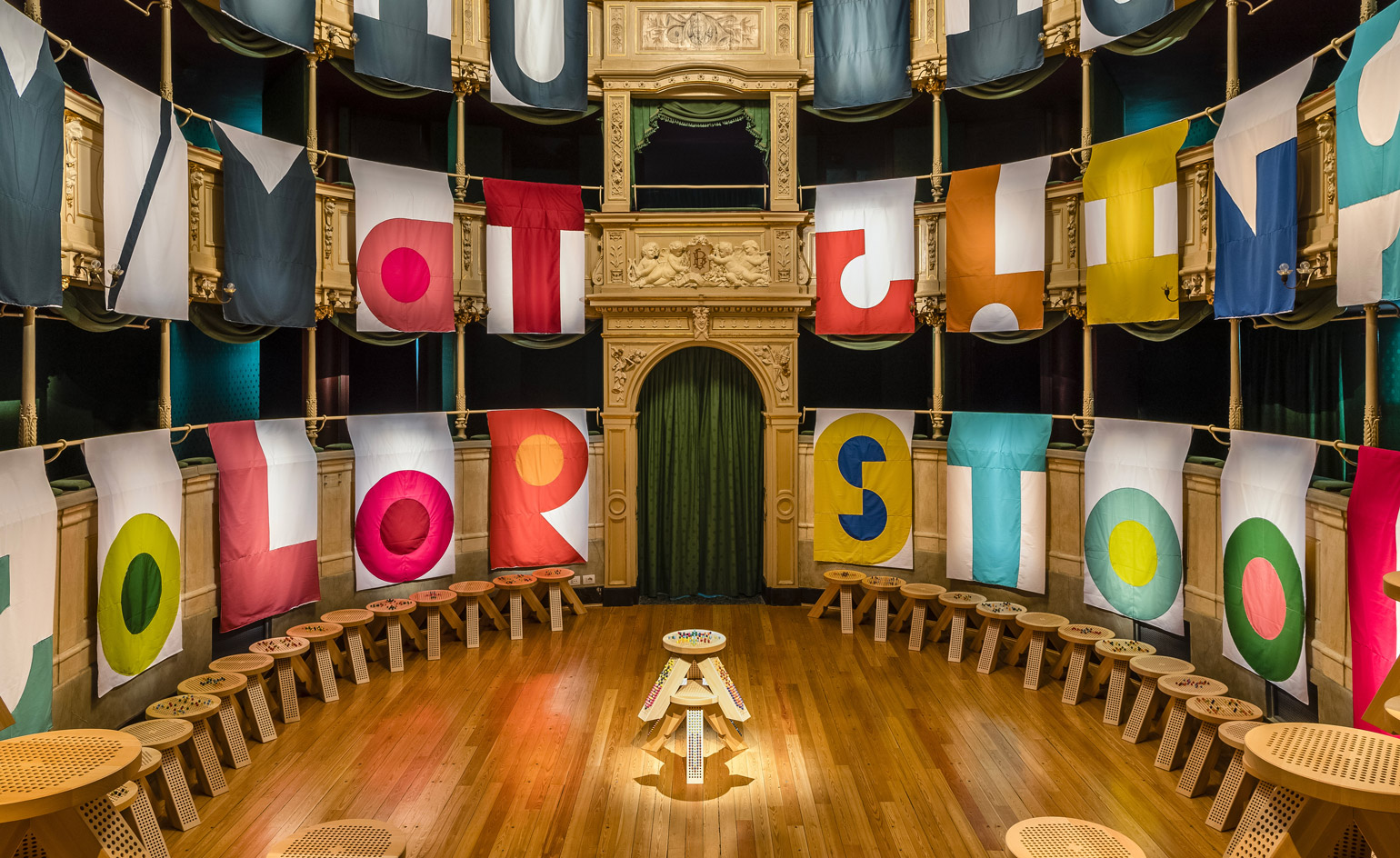
Miu Miu Staged at Teatro Gerolamo
Miu Miu: Staged at Teatro Gerolamo, a former puppet show theatre in the shadow of the Duomo, Miu Miu’s limited-edition furniture collab with M/M (Paris) takes center stage. Inspired by the decor of the A/W 2018 show and made of linden wood, the three-legged stool is punctured with perforations. The potential for play and personalisation is endless: coloured matchsticks turn the seat into a puzzle, reflecting the cheerful spirit of the fashion brand, interpreted through the graphic eye of Mathias Augustyniak and Michael Amzalag’s namesake agency.
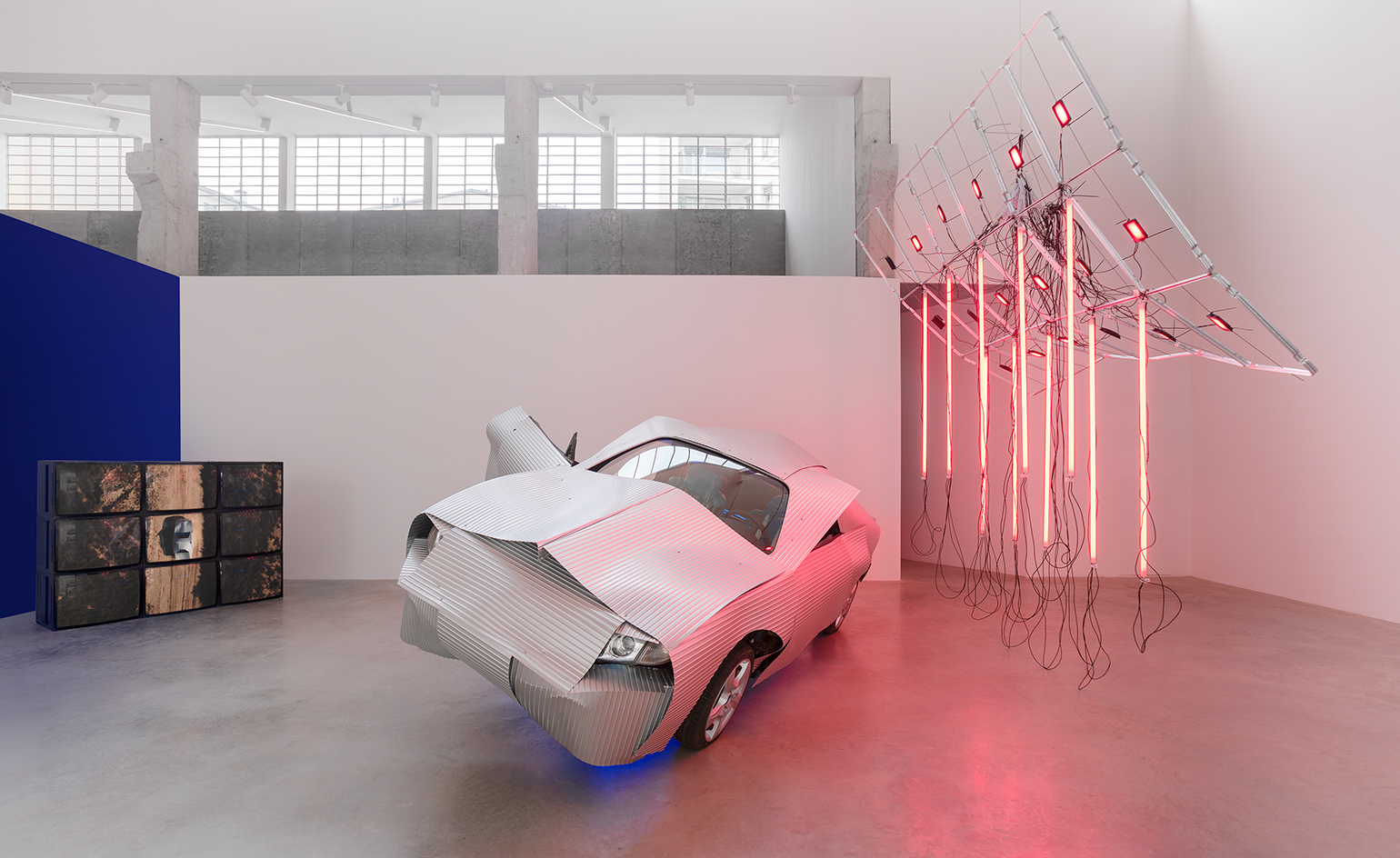
Rimowa installation
Rimowa: The luxury luggage brand has teamed up with creative studio Kaleidoscope and Spanish designer Guillermo Santomá to create a special installation, short film and one-off print publication. Entitled ‘GAS’ after Ed Ruscha’s Twentysix Gasoline Stations series, the installation element turns a fully functioning car - customised with Rimowa aluminum - into a light and sound sculpture, surreal suspended in mid-air.
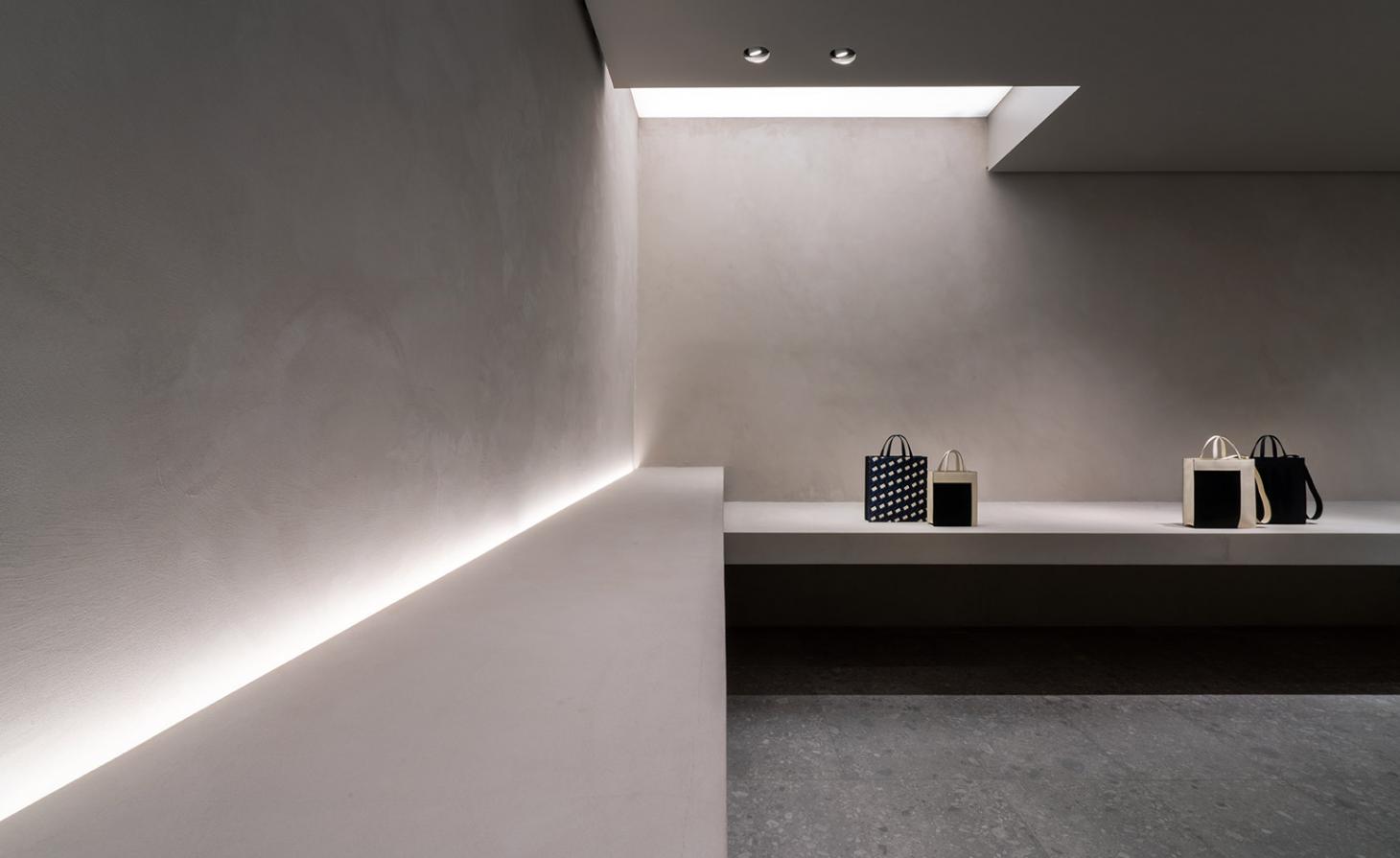
Valextra's Via Manzoni
Valextra: Each year, Valextra entrusts it’s flagship store on Via Manzoni to a different architect, from Kengo Kuma to Snarkitecture. This year, the British master of minimalism, John Pawson, was enlisted to transform the space for good, marking an end to those annual refits (at least another edition of Salone del Mobile beyond this year). True to form, Pawson’s gone back to basics, creating a spatial narrative through architectural proportion, simple surfaces and sparse displays. The Ceppo di Gré floors set the tone for the monochrome colour palette, broken only by the museum-like exhibit of the Italian brand’s wears. Most pleasing of all is the library of small leather goods, small sets of which are bookended by geometric blocks and balls of marble.
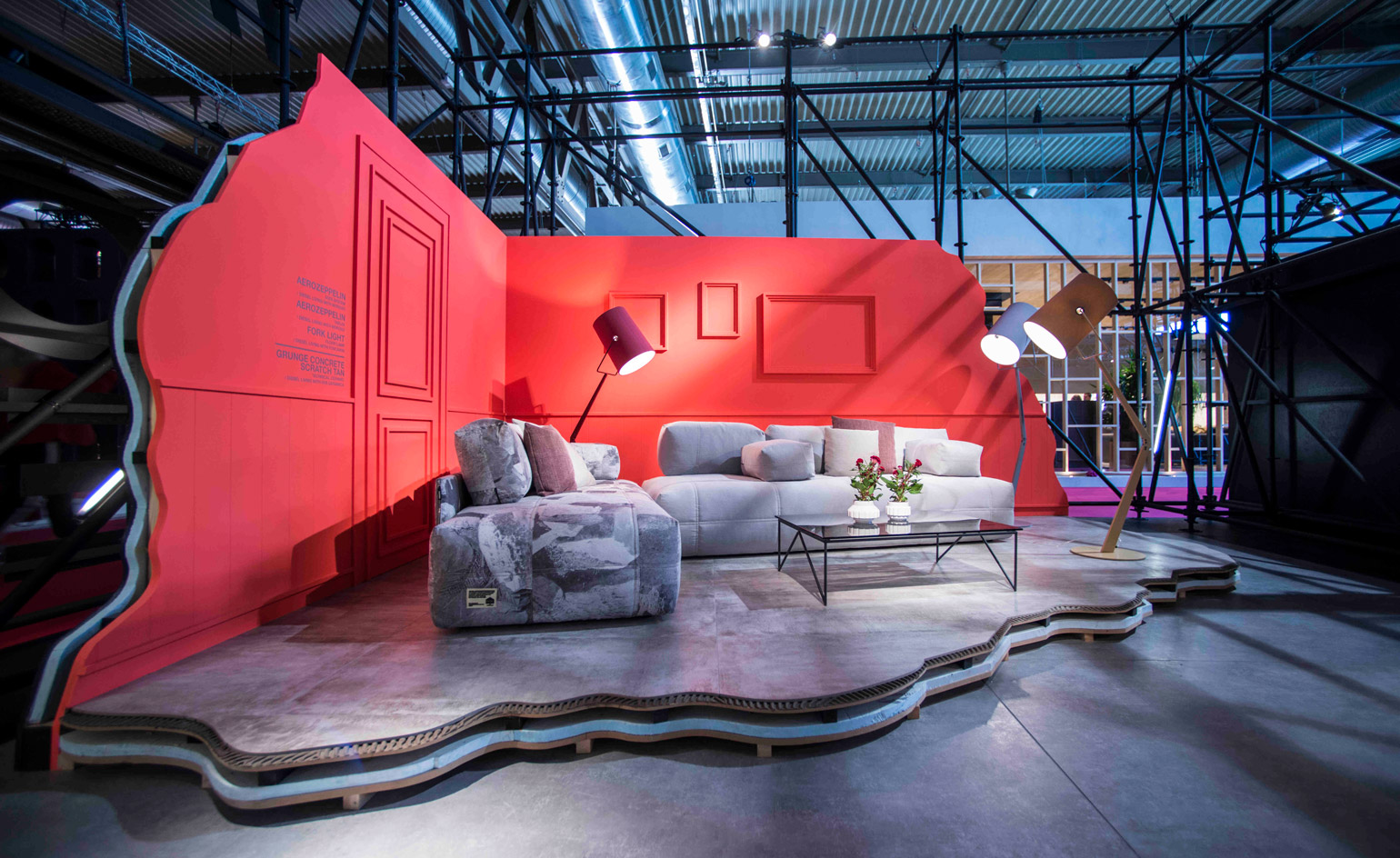
Diesel Living domain
Diesel Living: The Diesel domain looks like a construction site, in the best possible way. Inspired by the idea of building a future using the past’s materials, and a present in a constant state of flux, the brand’s ‘Work In Progress’ display is as industrial as it is charming. Working with Moroso, Aerozeppelin is their newest sofa, putting a vintage bent on seating solutions. Poised on a platform, it seems to float, while soft pillows and armrests can be moved and styled at will. Those looking for something more playful still can look to their Foscarini collab, a decade in the making, and most specifically still, the wrecking ball lamp.
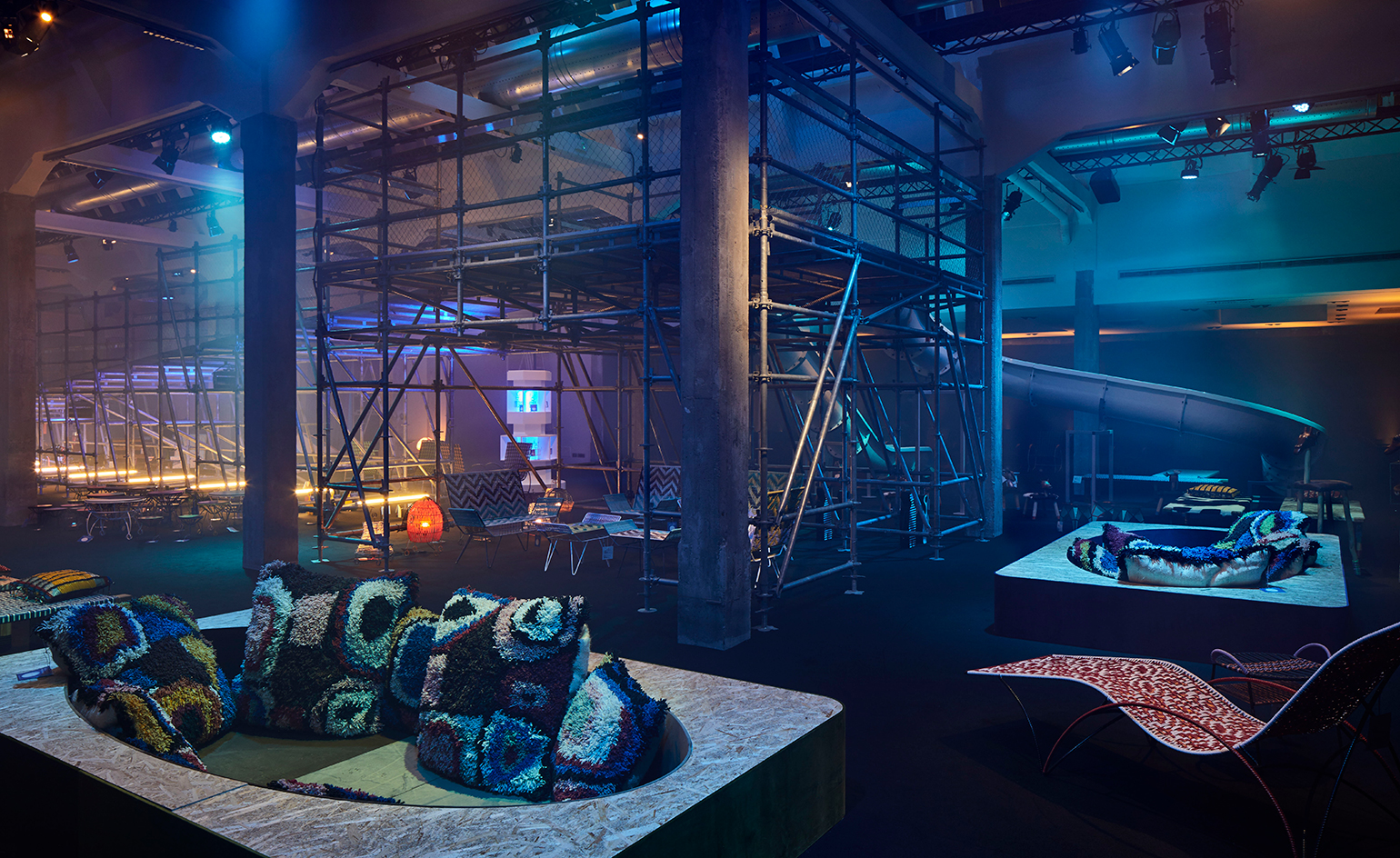
Viale Umbria Marni Moon Walk
Marni: ‘We like to explore different paths, different ways to make creativity,’ Francesco Risso tells Wallpaper*, ‘to make Marni as a whole world that can be fully experienced rather than just consumed.’ This year, the fashion brand has turned Viale Umbria into the Marni Moon Walk, an otherworldly experience with a social bent. ‘It’s about what the brand can bring to the outside world,’ explains the creative director, who’s chosen to support Future Brain Project, a charity which helps children undergoing treatment at the neuro-oncological ward in Rome, with a share of the profits. ‘I truly believe in humanistic value, sense of community, and connection through mindful creativity,’ he says. Designed by Colombian artisans, as is now tradition with Marni’s Design Week collections, the furniture and objects - from primitive benches to sculptural metal tables - really are out of this world.
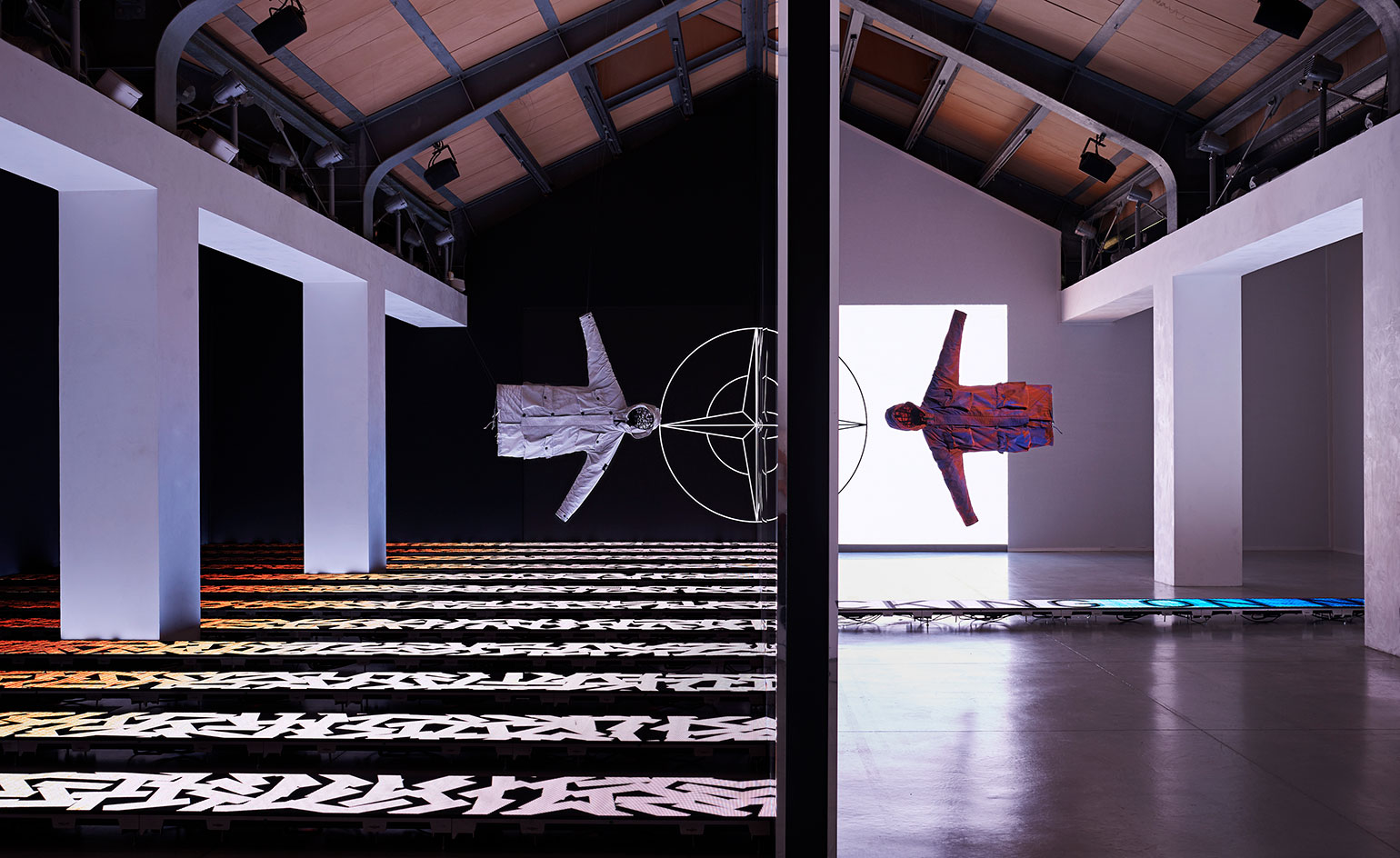
Stone Island Salone del Mobile
Stone Island: Technical innovation is synonymous with Italian performance wear expert Stone Island. Salone del Mobile provides a platform for the label to showcase its ‘Prototype Series’, a range of pieces limited to 100, that debut technically incredible pre-industrialised techniques. Its previous three iterations have debuted techniques including a resin coated anorak which features thousands of glass microspheres and a 4 polyamide-based canvas fabric which can be shrunk and compacted to various sizes. Prototype_Research Series 4 was debuted with an installation by Ken-Tonio Yamamoto and Nina Heydorn at Stone Island's Via Savona showroom, and featured garments produced in a nylon metal, made using an artisanal flocking material and an electromagnetic technique.
Receive our daily digest of inspiration, escapism and design stories from around the world direct to your inbox.
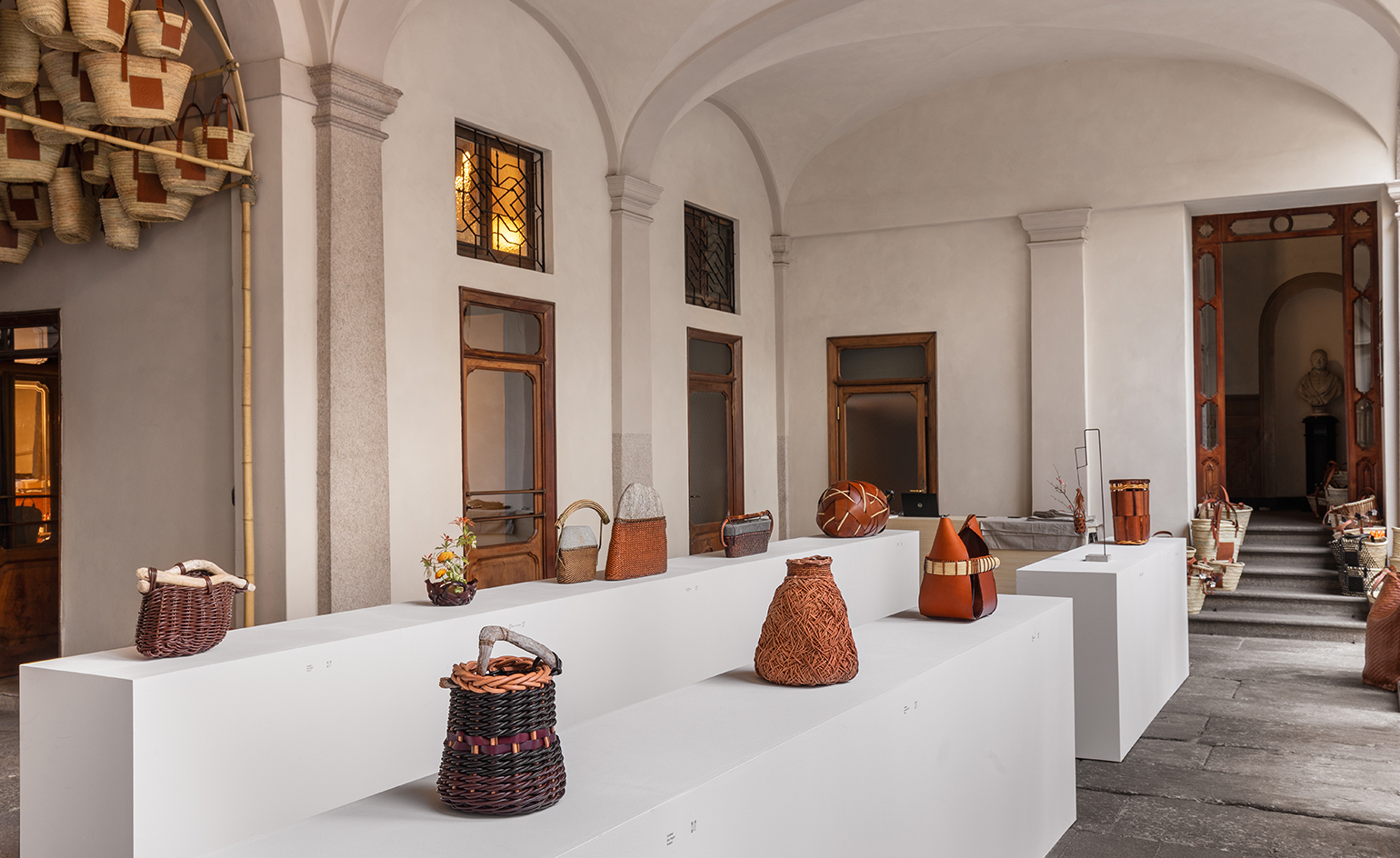
Loewe gallery
Loewe: The pursuit of quality and celebration of craft has become the Spanish luxury brand’s calling card at Salone. Returning for the fifth year, this year’s exhibition, titled ‘Loewe Baskets', was two years in the making. Jonathan Anderson’s challenged traditional artist from Japan to Africa to replace their usual materials of choice with leather. The results are poetic, displayed in the courtyard against a backdrop of hanging linens. There collection of traditional basket bags offers us, spectators, an accessible way to join in on the celebrations, too.
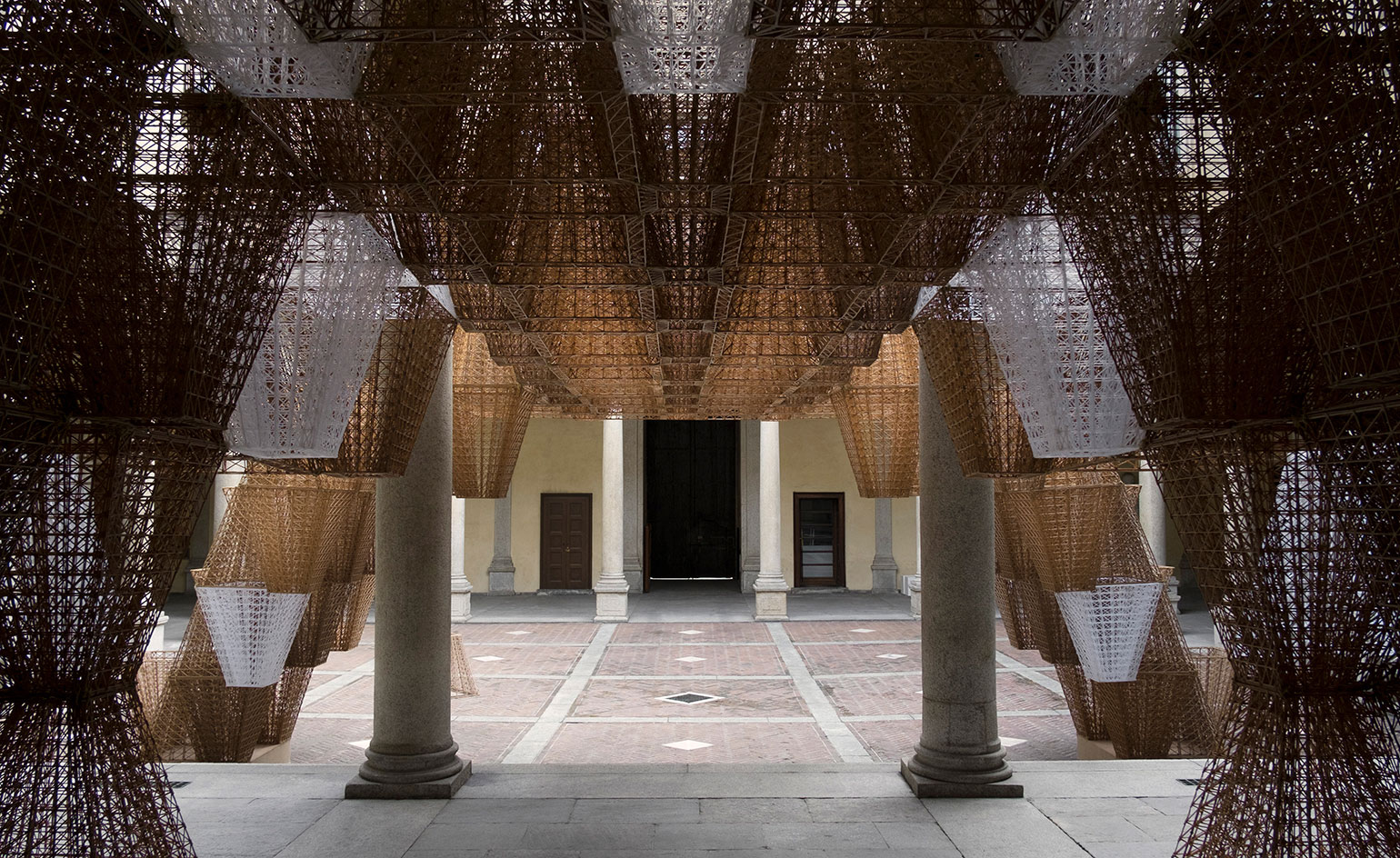
Cos desert experience
Cos: Last year Cos’s creative director Karin Gustafsson was looking to the desert-set sculptures of American artist Phillip K Smith III for inspiration. This year, she and her team have looked to another desert experience entirely: Burning Man. Working with London-based architect Arthur Mamou-Mani and inspired by his 2018 temple Galaxia, Cos has returned to the 16th-century Palazzo Isimbardi with a pavillion of 3D-printed pyramids titled ‘Conifera’.
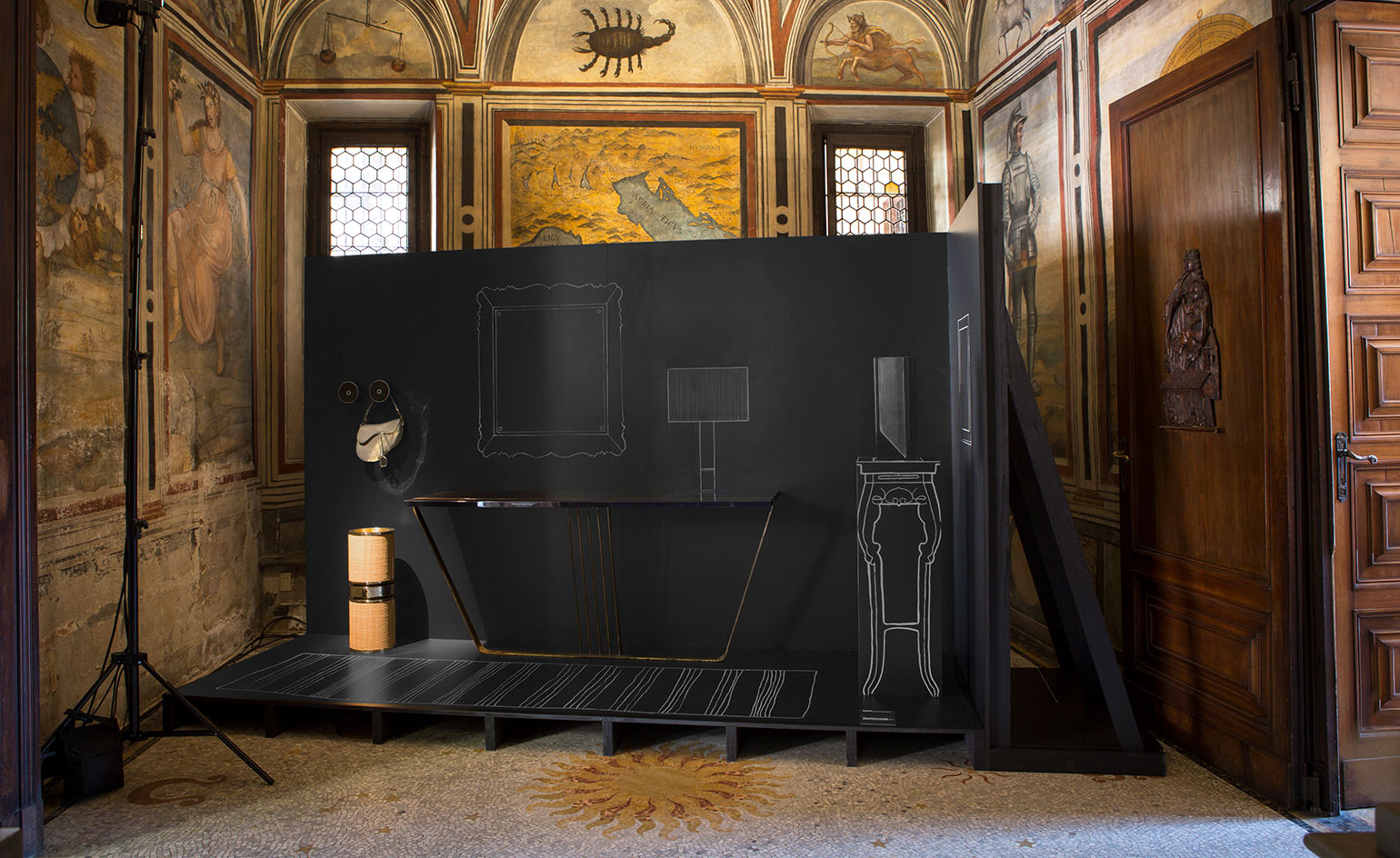
Dimore Studio
Dior: ‘I think we’re both very old inside,’ jokes Britt Moran, one half of the dynamic duo behind Dimore Studio. ‘I think both of us are very nostalgic, and we like things from the past. But we’re not here to recreate a museum experience, we are here to make things that are of the day.’ Enlisted by the French maison to create a 14-piece collection of precious objects - spanning candelabras, frames, trays and beyond - Moran and Emiliano Salci’s signature aesthetic is clear to see in their contemporary take on Monsieur Dior’s obsession for all things 18th century. Displayed at the impressive Casa degli Atellani, the precise collection shines bright against chalk-drawn vignettes that represent different domestic spaces. ‘We wanted to make sure that the objects were the protagonists,’ explains Moran. The use of rattan is a first for the Milanese-based studio. ‘For us was a nod to the cannage, which is historically the Dior symbol,’ he says, pointing out the polished gold and rattan vases as his favourite. Salci meanwhile, favours the hefy plexiglass pieces.
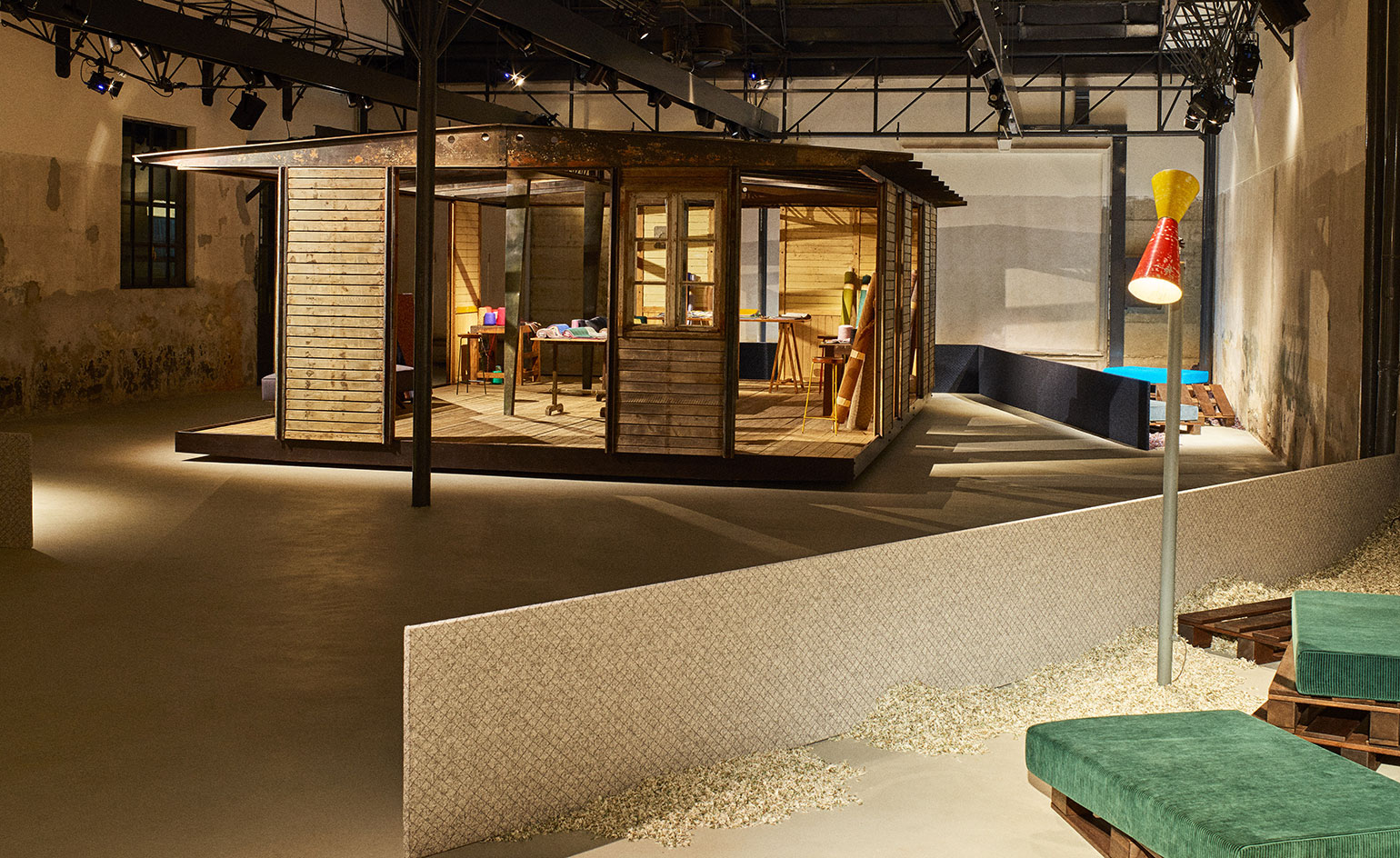
Kvadrat/Raf Simons Garage 21
Kvadrat/Raf Simons: ‘No Man’s Land’ is Simons’ serene but surreal suburb, set up in Garage 21. A perfect moment of solace from the hubbub of Fuorisalone, the space features a series of prefab Jean Prouvé structures, a blooming bed of wildflowers by Mark Colle, and creative displays of the new Kvadrat textiles, designed by the former chief creative officer of Calvin Klein. Now in it’s six iteration, four new upholstery fabrics join the Danish brand’s roster: Atom, Phlox, Novus 1 and Novus 2. ‘I am interested in all the qualities that have an origin in fashion like bouclé, tweed and corduroy,’ says the Belgian designer of his new collection. ‘Because of the density that is needed for furniture in order to make it last in the long run, it becomes even more interesting I think.’ Those who didn’t stay for the laid-back, composed and creative display, will no doubt have done so to dine at the cafe, catered by London favourites of Rochelle Canteen; a sweet addition to an already sublime space.
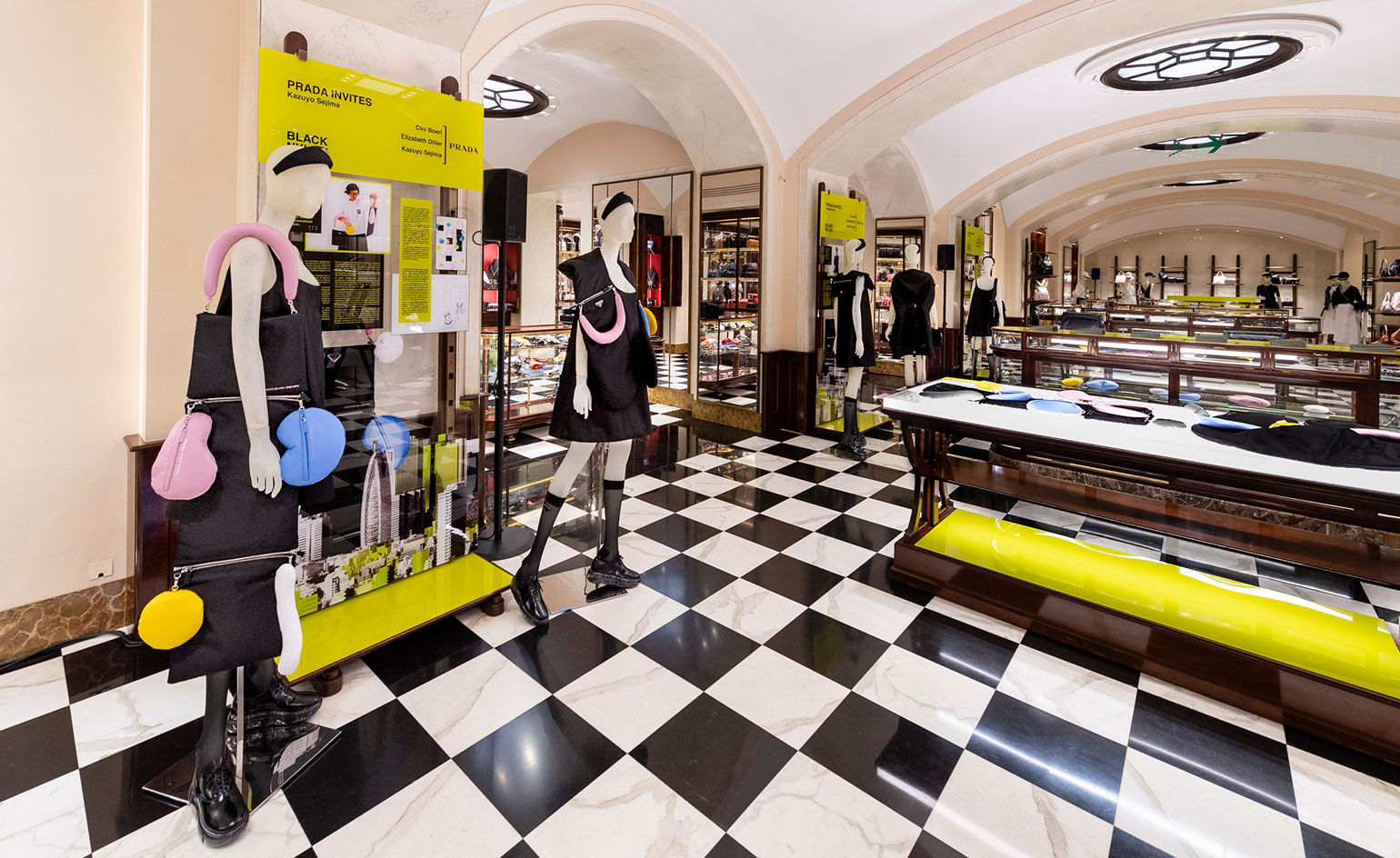
Prada store
Prada: Three top architects walk into a Prada store… That isn’t quite how Prada Invites, the Milanese fashion brand’s latest project began, but Miuccia Prada did write to Cini Boeri, Elizabeth Diller and Kazuyo Sejima to invite them to design something for the S/S 2019 collection. Invited to explore ‘the universe of nylon’, their resulting designs elevate the utilitarian material - and Prada’s signature fabric - into wearable architecture. Boeri’s bag - born out of the ‘desire to create to create something new and useful’, she says - grows and shrinks in size, depending on your needs. Diller, who sees Prada as ‘the defamiliarisation of the everyday’, has reinterpreted the backpack into a yoke-like form, which can be worn over the shoulders or carried as an elongated envelope bag. Sejima’s designs on the other hand are a playful ode to freedom: a scarf bag and a modular piece, both of which feature removable pouches and handles in contrasting colours and varying shapes and sizes.
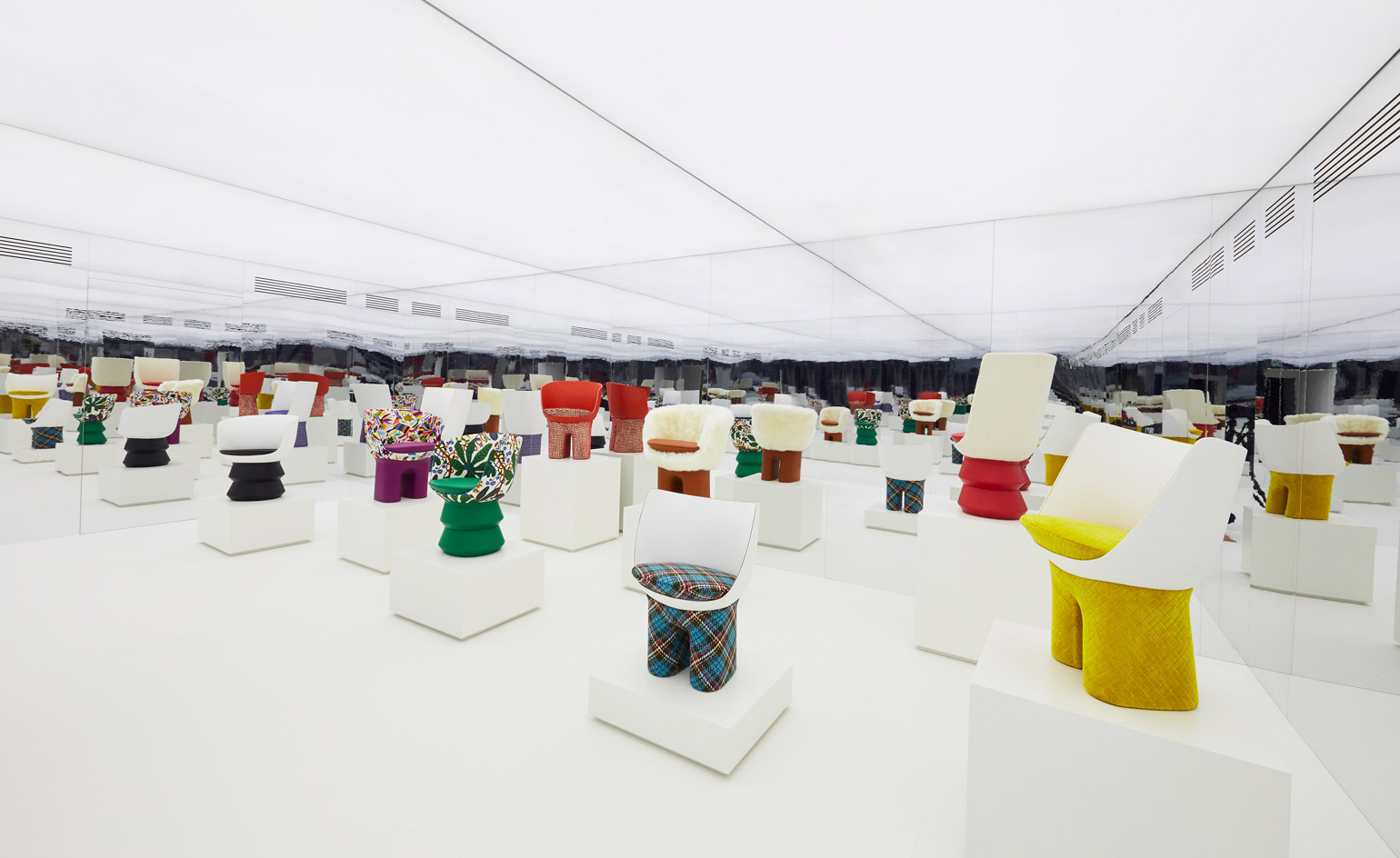
Louis Vuitton gallery
Louis Vuitton: The Objets Nomades are on the move this year: leaving Palazzo Bocconi, their longtime home, and decamping to Palazzo Serbelloni. The venue’s celebrated ceilings were either entirely or partly hidden from view, unforgivable were it not for the sea of Barber & Osgerby’s bell lamps hanging from scaffolding. Of the six new pieces - designed by the Campana brothers, India Mahdavi and Marcel Wanders - the true standouts are Raw Edges’ jovial doll chairs and Zanellato/Bortotto’s meditative mandala screen.
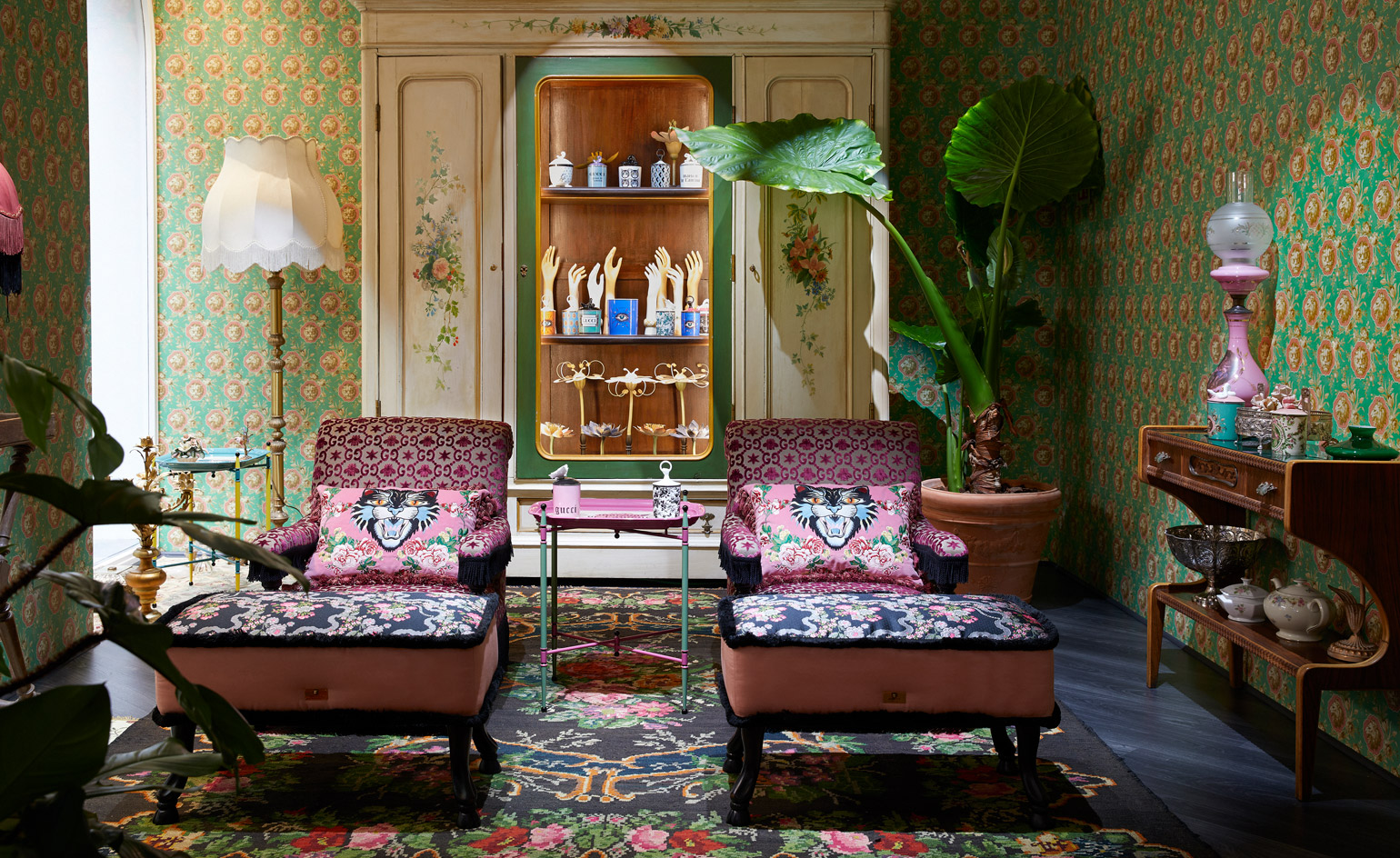
Gucci pop-up
Gucci: There’s nothing quite like a pop-up, or indeed a Gucci pop-up. To coincide with Salone, Alessandro Michele’s opened up a temporary store dedicated to the Gucci Décor interior collection which first launched in 2017. Found on Via Santo Spirito and due to remain open until June, the two floor showcase is a maximalist’s dream-come-true: bold patterns, flora and fauna symbols, rich wallpapers, Richard Ginori porcelain and fetching furniture - including a new, shell-inspired armchair - abound.
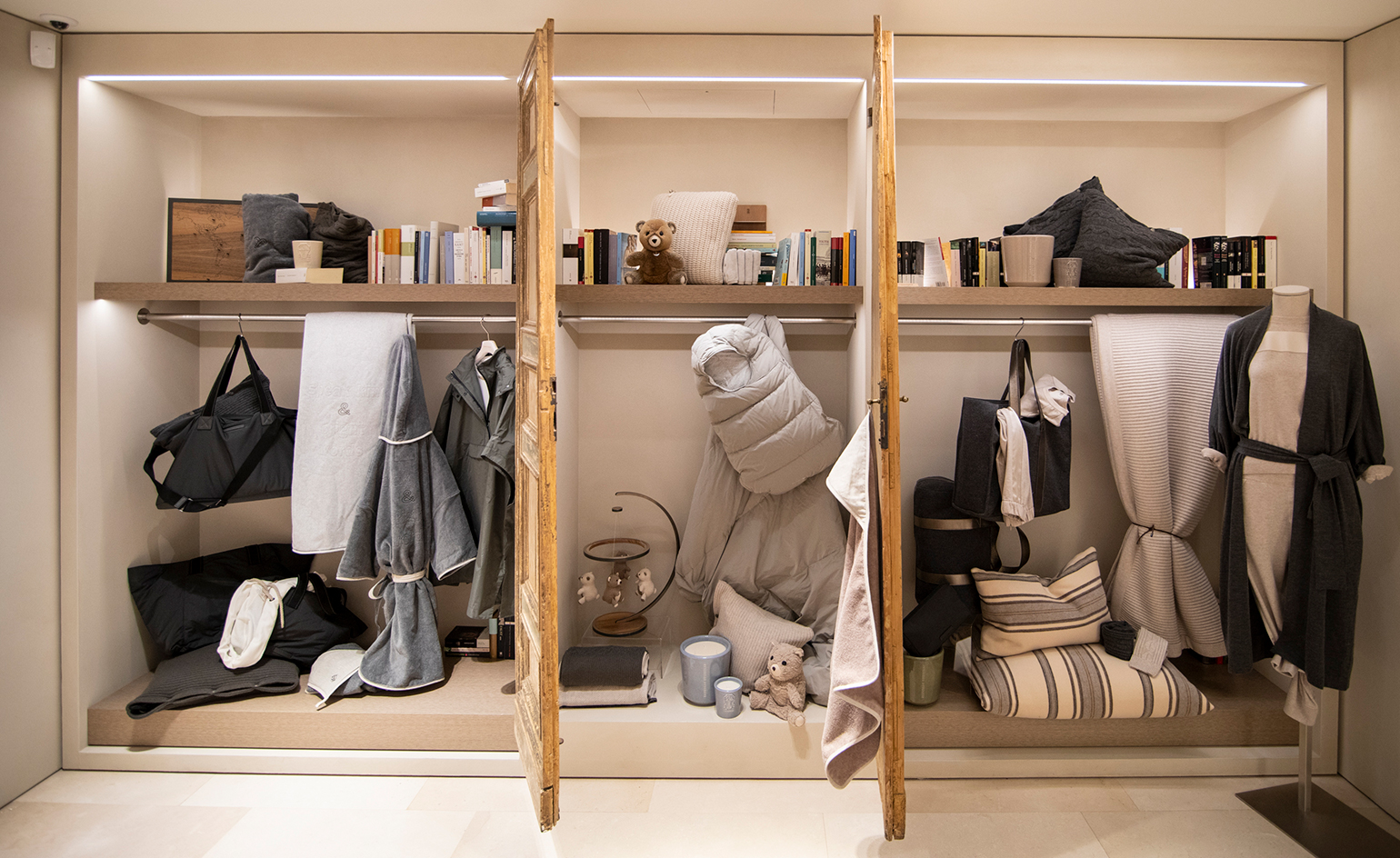
Brunello Cucinelli's Via Montenapoleone store
Brunello Cucinelli: Stepping into the Via Montenapoleone store of the Italian luxury brand is like falling into a cashmere blanket. If the soft towels, silky nightgowns and cosy cashmeres don’t make you reach for a feel, the new ceramic series - which marries the skill of Umbria’s master ceramists with contemporary design - will. The handmade series have raw surfaces, left uncoloured in tribute to the tradition behind them and the material itself.
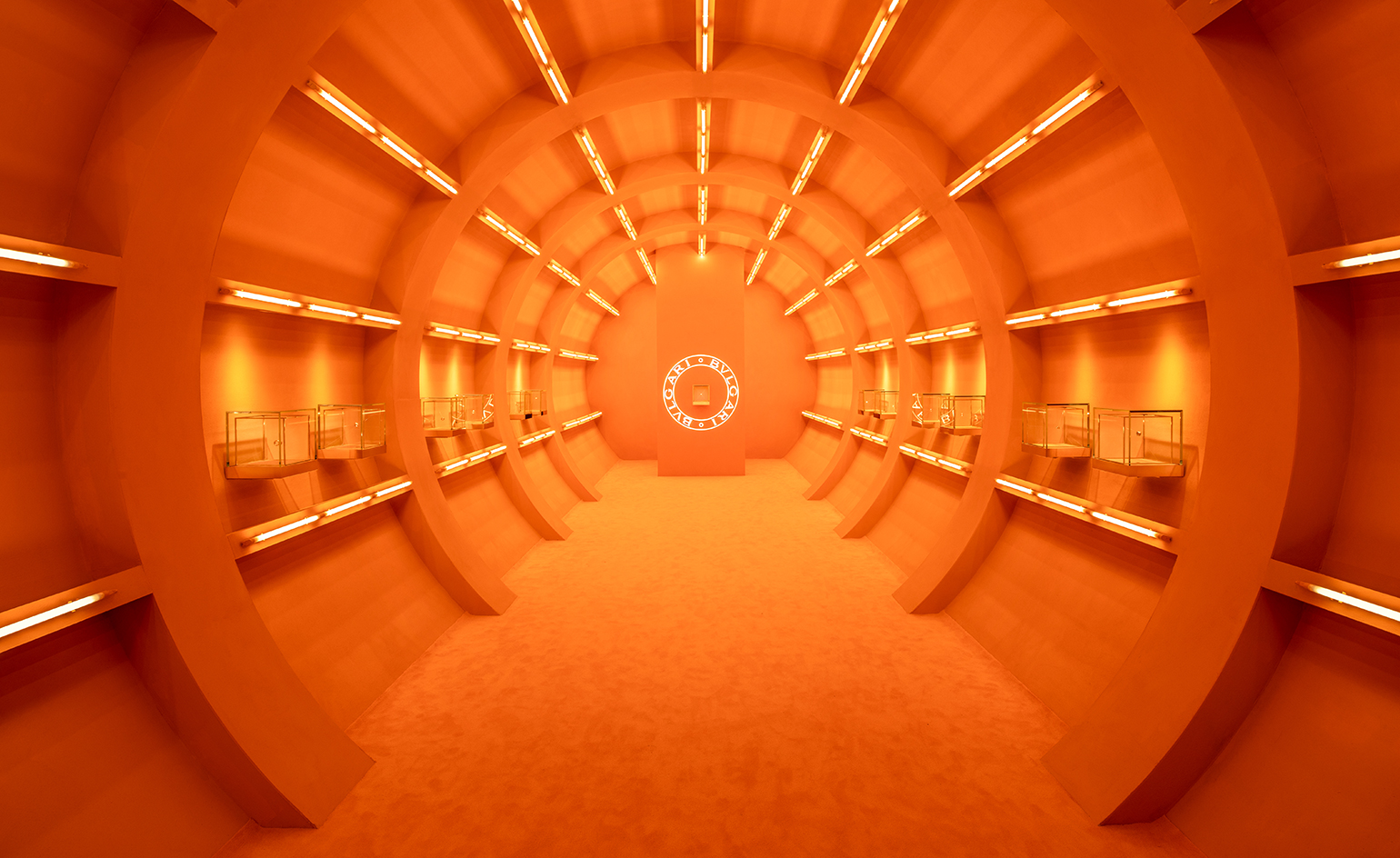
Bulgari immersive installation
Bvlgari: The Roman maison is celebrating a second year at Milan Design Week with a double display. At the Ulrico Hoepli Municipal Planetarium, Argentine artist and 2018 Wallpaper* Guest Editor Tomás Saraceno’s ‘The Cosmic Web’ draws parallels between his famous complex spider webs and the universe, while the surrounding gardens of the Planetarium host an immersive experience which explores the duality of the materials and techniques the jeweler has become known for. No expense has been spared on the immersive installation which has more than one #selfie opportunity.
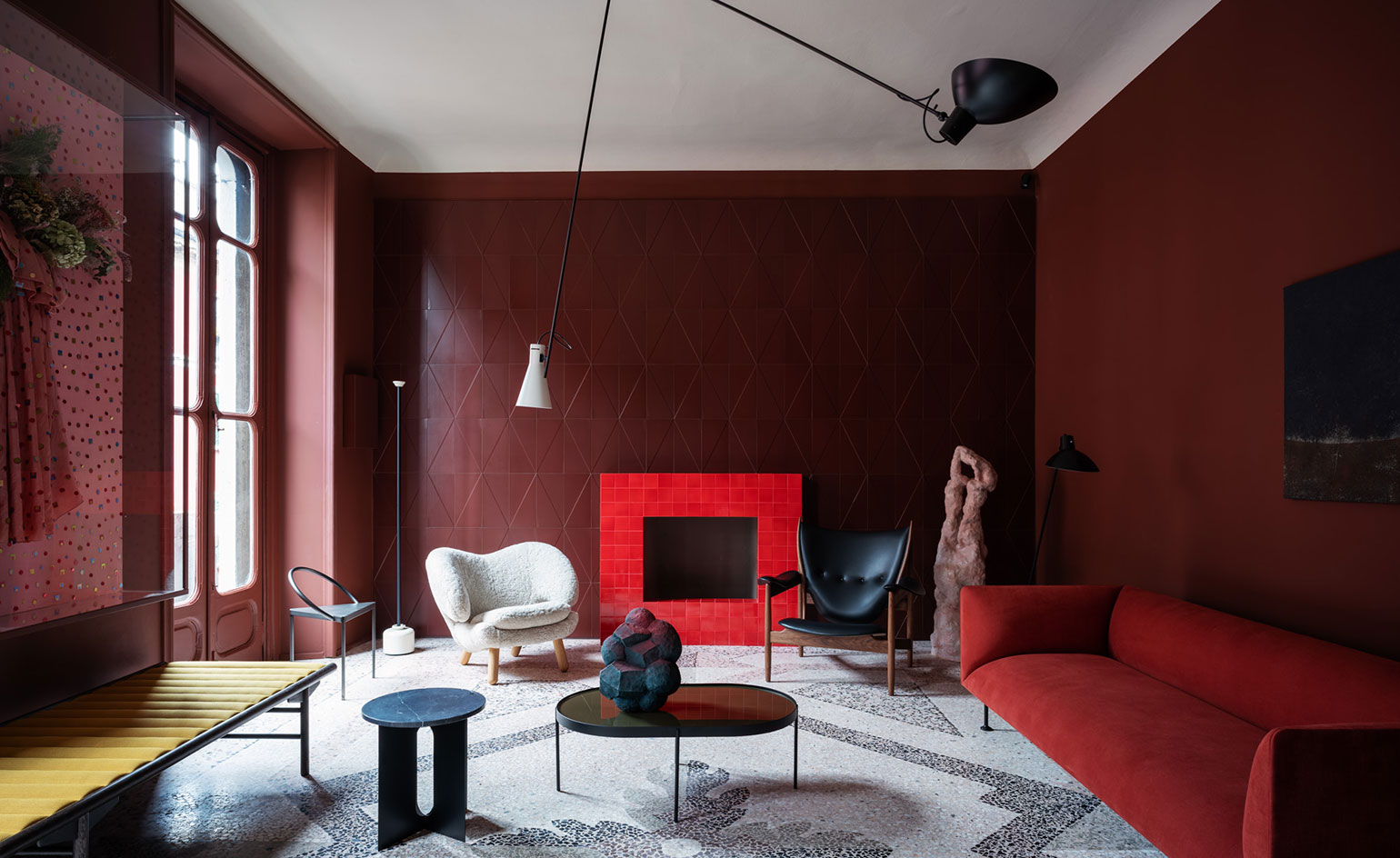
Stine Goya ‘Perfect Darkness’
Stine Goya: ‘Perfect Darkness’ seems an odd name for such a delightful space, but that is the moniker designated to the apartment installation. Set a floor above Dimore Studio’s popular Via Solferino studio, the space celebrates a collective of Danish and Italian designers, curated by Elisa Ossino and Josephine Akvama Hoffmeyer, and featuring fashion designer Stine Goya, making its Milanese debut. Sculptural displays from the label’s A/W 2019 collection appear around the abode, while an art piece - created from excess fabrics and organic materials - takes pride of place in the living room. ‘The inspirations for my hand-made prints are influenced by and drawn from a diverse selection of historical references and design movements, which always seem to come to life at Salone del Mobile,’ says the label’s creative director.
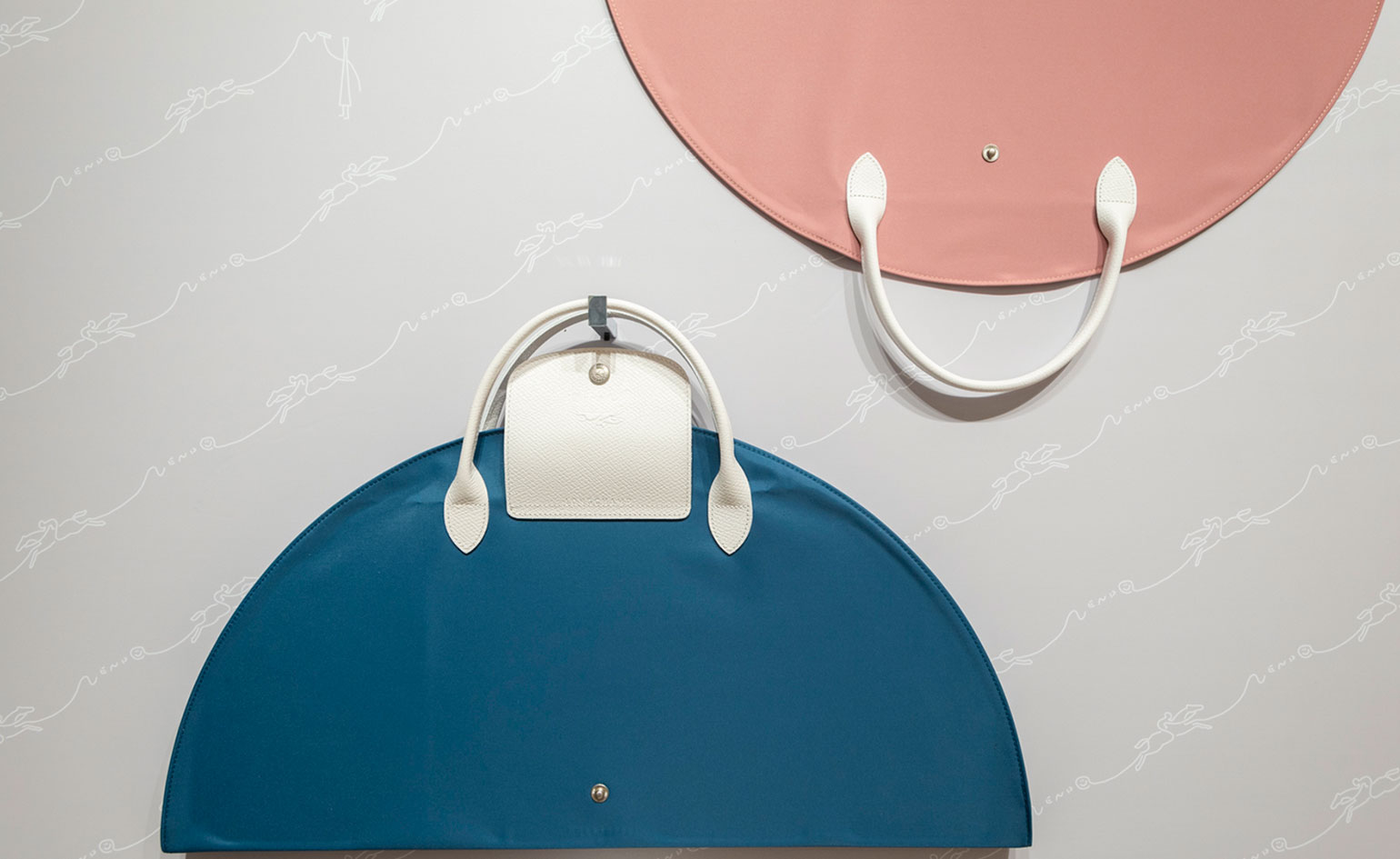
Nendo gallery
Longchamp: It’s a wonderful fit that the French luxury goods house chose to collaborate with the prolific Japanese studio Nendo: Longchamp’s signature Le Pliage bag which launched in 1993, was originally inspired by the art of origami. Nendo’s head of design Oki Sato, whose recent innovations include an L shaped mobile battery that you charge with your hands and a dining chair collaboration with Fritz Hansen, creates objects that generate ‘!’ moments in everyday life. There’s an exclamatory appeal behind his take on the La Pliage signature, which features three different iterations: a practical design which can be transported into a cube and used as a home storage solution, a cone-shaped bag with a single handle which can be hooked on a rail, or a circular bag inspired by furoshiki folding cloths. Exclamation marks indeed!
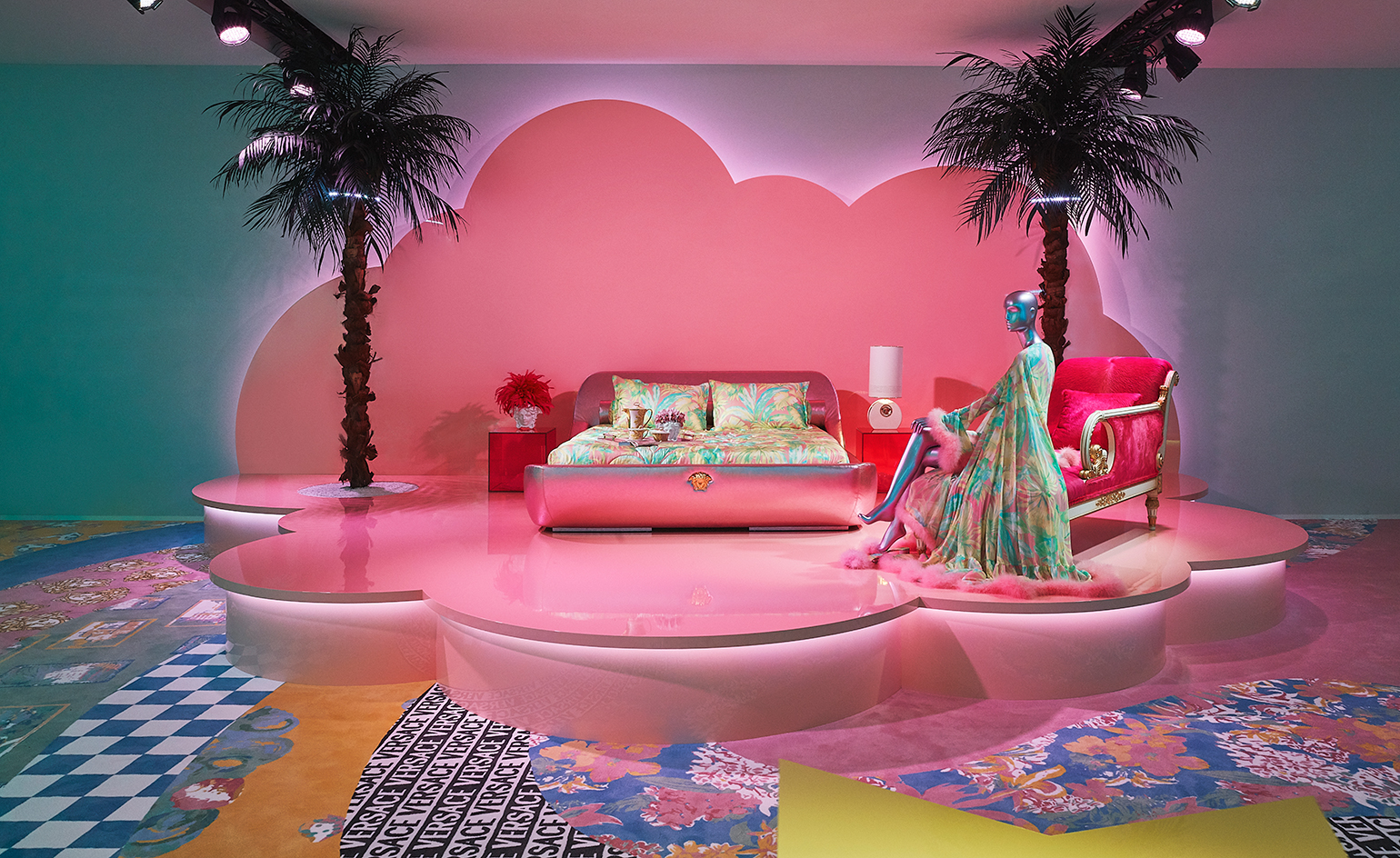
Versace gallery
Versace: ‘Versace lives through colour and pattern, breaking rules and promoting a sense of confidence and glamour which is how I decorate,’ says American interior designer Sasha Bikoff. Her words ring particularly true after seeing the vivid installation she’s created at Via Gesù’s Palazzo Versace. Taking cues from Richard Avedon’s A/W 1994 campaign for the Italian brand, Bikoff has married fashion and interiors, creating a mise-en-scène in acid bright lights with a serious Miami feel. Artist Andy Dixon’s supersized, hand-painted shirts are on display too: the perfect finishing touch to an already very vibrant space.
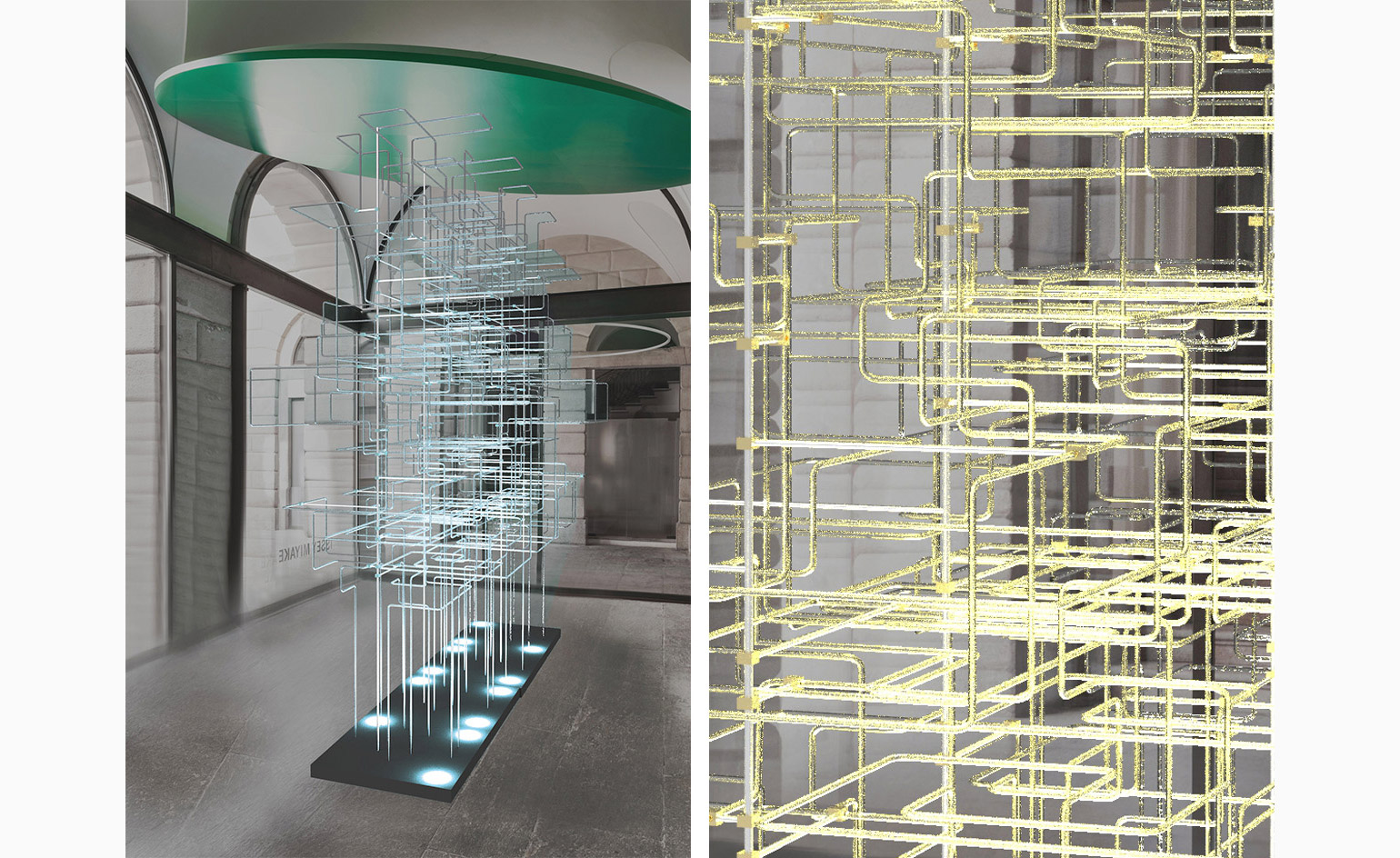
Issey Miyake Salone
Issey Miyake: Water and air are Dutch designer Jólan van der Wiel’s main materials for his gravity-defying installation, ‘Journey of a Raindrop: A Strange Attraction to Water’. Hosted at the Japanese brand’s Via Bagutta outpost, a series of glass tubes - some bent, some spiraling, some folded into seating propositions - are simply a means of employing said materials. ‘I wanted to create the effect of water flying through the building,’ he tells Wallpaper*. ‘I am interested in visualising natural forces within our daily environment, but it is also an effective way of tackling a huge subject in a small and personal way. Think about the life of a single drop: it’s traveling all over the world, meets many cultures and natural forces along the way. It also meets friends - other drops - and turns into something else: a river. We all need water. It can be beautiful but also devastating.’
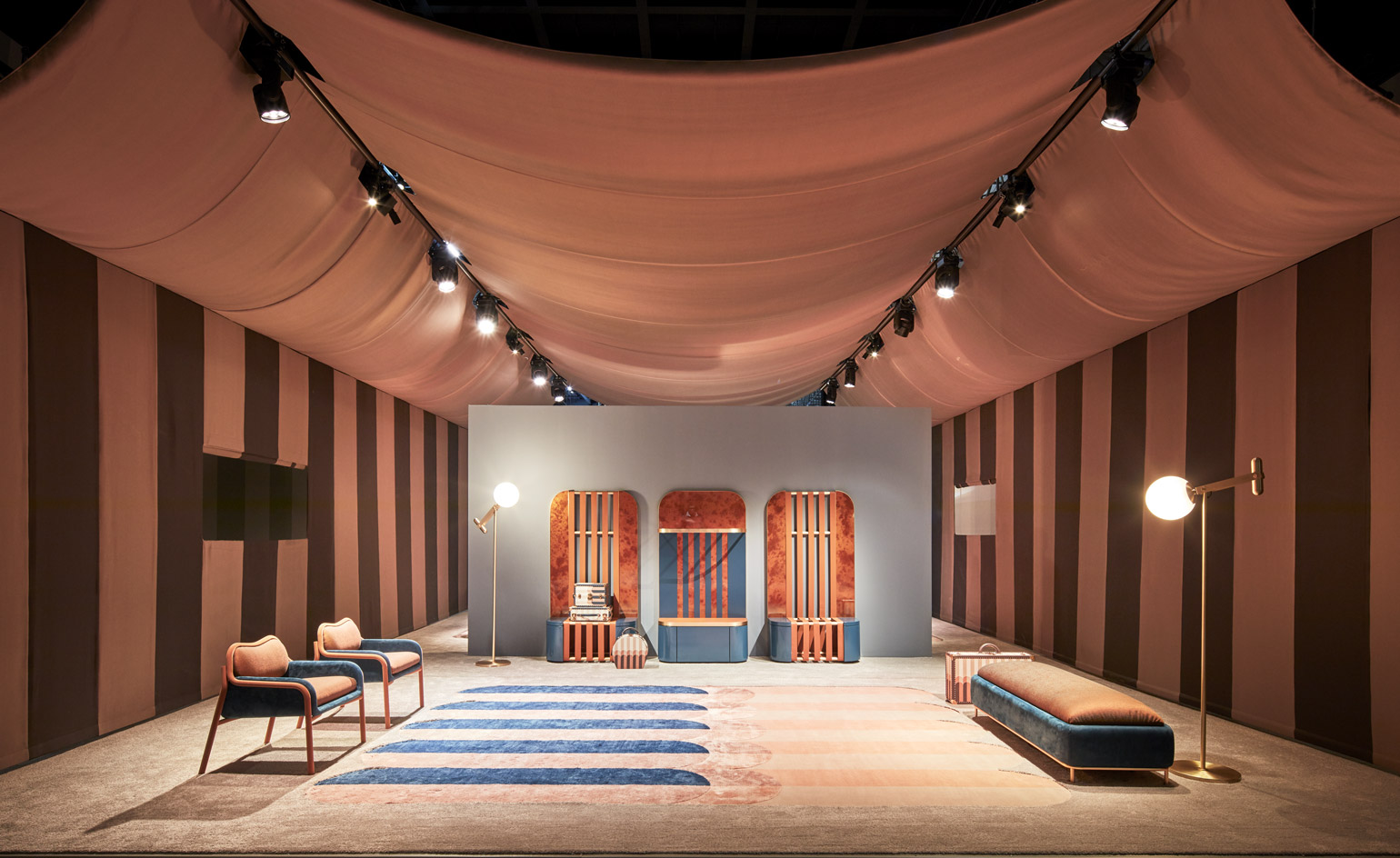
Fendi Back Home
Fendi: Back in cahoots with architect and interior designer Cristina Celestino, the luxury house has turned its Via Solari outpost into a classic Roman home, complete with a terrace and terracotta flooring. Titled ‘Back Home’, Celestino’s collection is firmly rooted in Fendi’s aesthetic, employing the pequin motif - first introduced back in 1987, the same year of the launch of its Casa interior design line - in the sophisticated of ways. The marble and onyx of the side tables, lamps and mirrors are warmed up with metallic detailing, and softened with plush carpets underfoot. Best in show (and no doubt making the late Karl Lagerfeld very proud indeed) are Celestino’s sofas: curved back and arm rests evoke a feminine sensibility, while the graphic pequin stripes at the base bring the perfect masculine counterbalance.
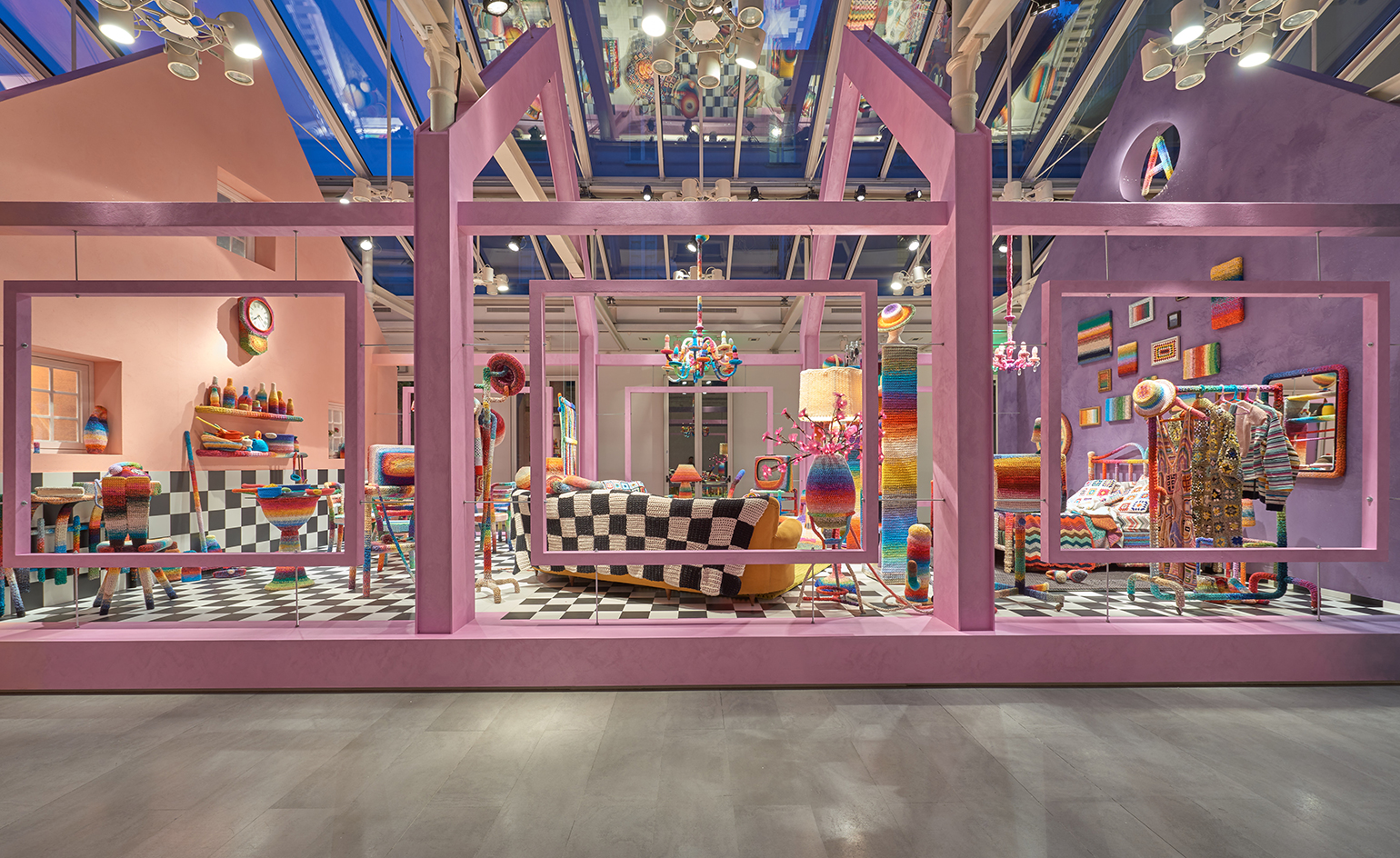
Missoni space
Missoni: Angela Missoni has entrusted the Missoni space on via Solferino to Alessandra Roveda. In turn, Roveda has created a wonderful imaginary world, wrapped up in crochet and knits. ‘Home Sweet Home’ features a series of rooms, each filled with everyday objects - clocks, books, television sets and cacti - all dressed in her signature multi-coloured knits. They are at once unequivocally familiar, and unexpectedly alien.
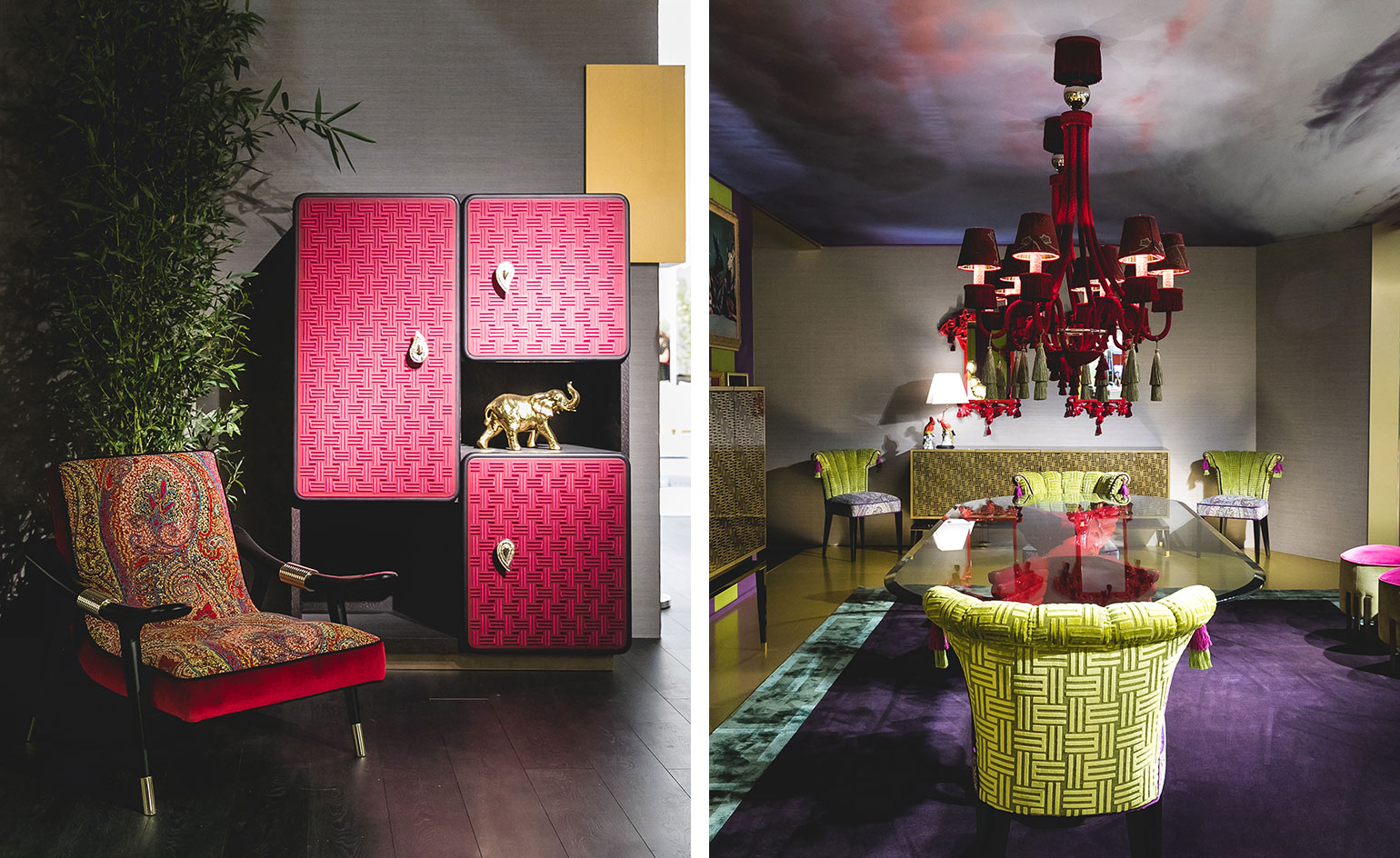
Etro furniture, homeware and wallpaper
Etro: The Italian family brand is known for its bold use of colour, prints and decadent finishes, both in its ready-to-wear and interiors. For this year's furniture, homeware and wallpaper unveilings, the theme was twofold. Blending together mythological references with and exotic flourishes, the collection is made up of conversation starters: think parrot- and rhino-shaped lamp bases, tiger-themed candle holders and pillows emblazoned with Pegasus, the house’s historic symbol. There’s plenty of paisley where that came from, too.
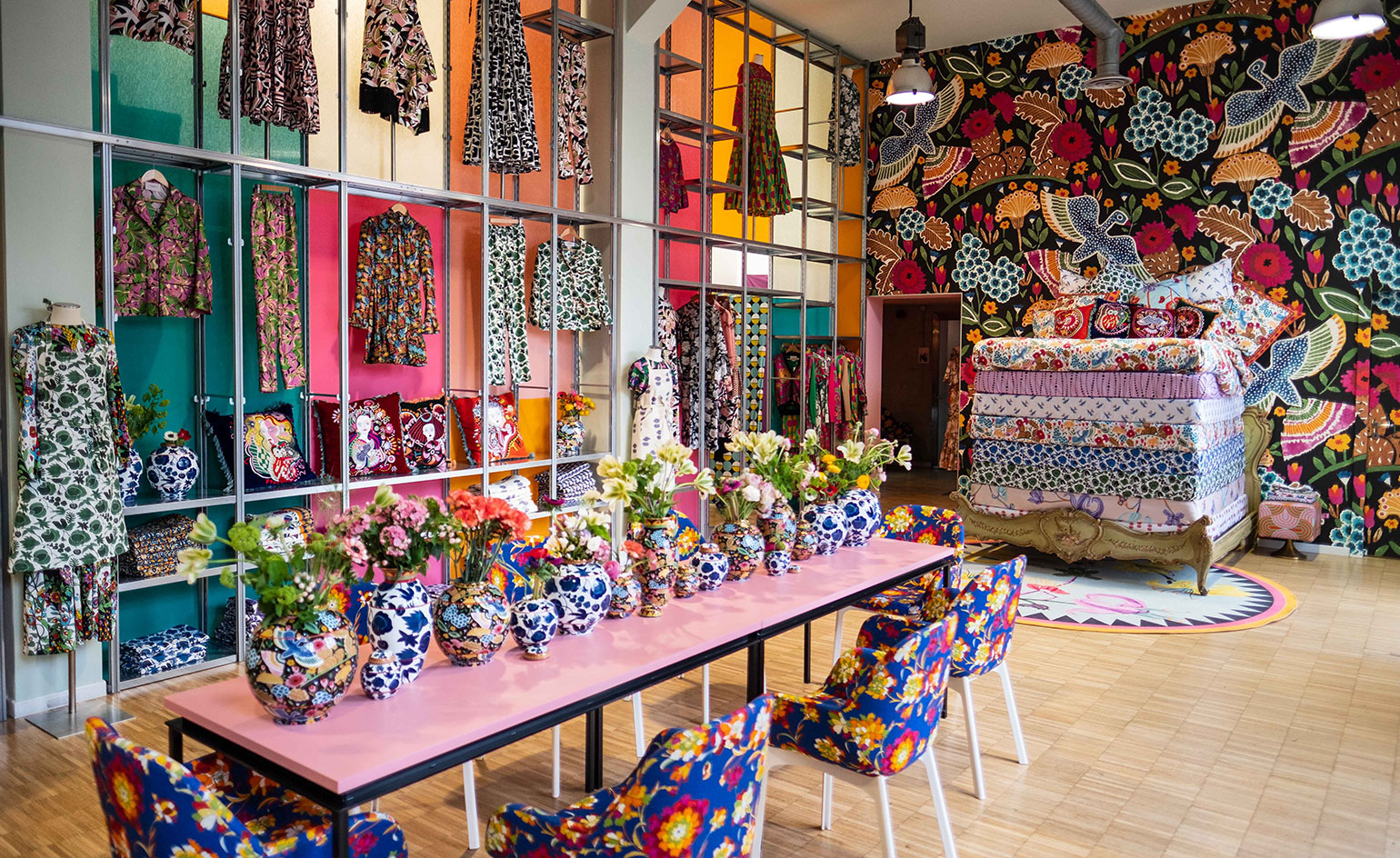
La Double J Homeware
La Double J: ‘We started La Double J Homeware on a lark,’ says JJ Martin, ‘it was a very spontaneous project. At first, I was just making clothes but it seemed pretty natural to start wanting to cover my dining room table with the same crazy patterns.’ Two years ago, she started with two dinner plate sets, then the collection expanded to include furniture from Kartell, porcelain plates produced in Verona, and colourful glasses handmade in Murano with Salviati. This year, she added bedspreads to the mix with La DoubleJ Bedtime, ‘a big collection of six different bedding families that you can mix and match with duvets, sheets, pillows, cushions and blankets.’ All 100 per cent made in Italy, 300 thread count satin finish cotton with contrasting embroidered trims. ‘We also launched colour-crazy porcelain vases – which are also made in Verona and were a veritable pain the back to make but utterly worth it!’
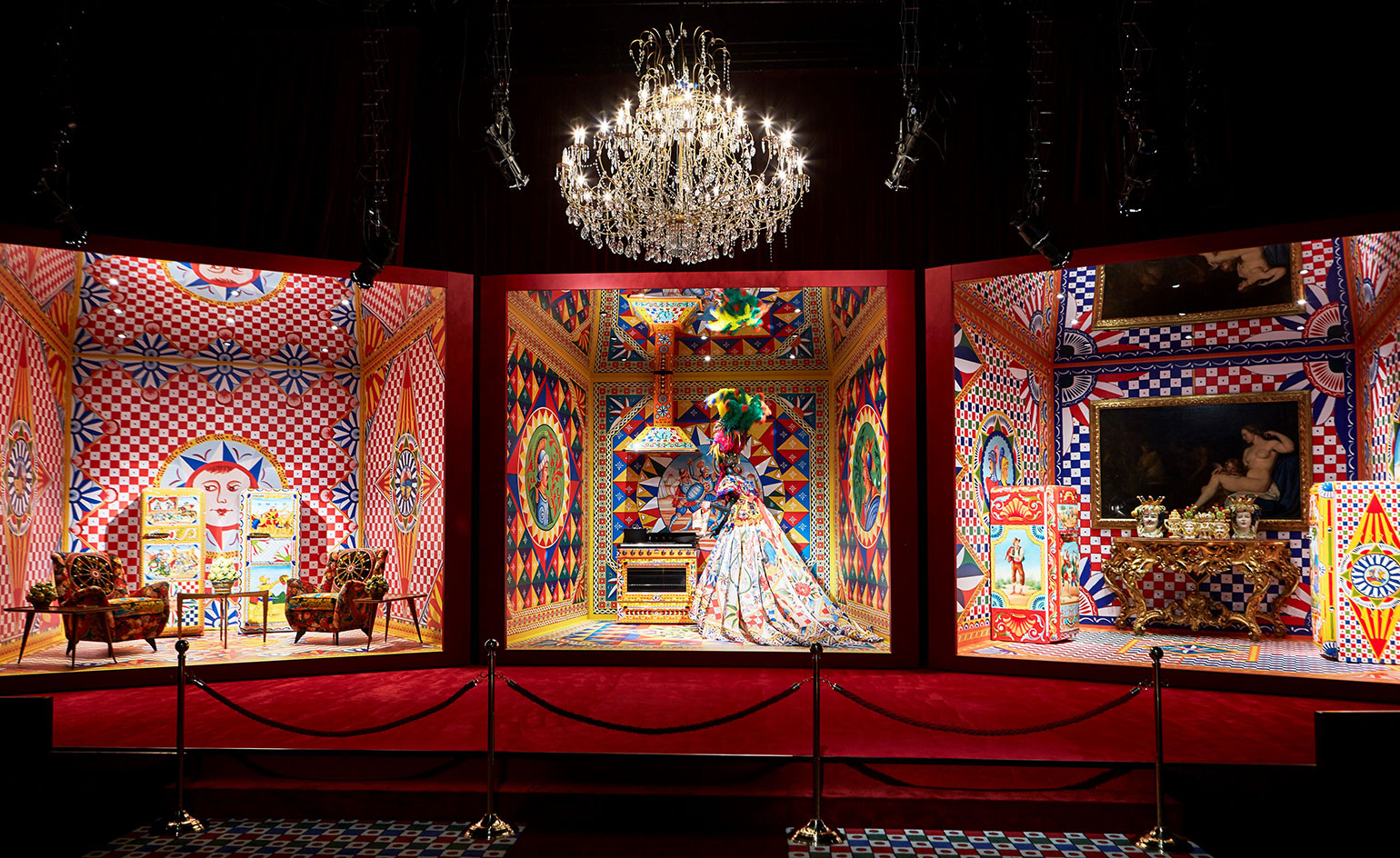
Dolce & Gabbana’s Metropol
Dolce & Gabbana: Joining forces with Smeg for a fourth consecutive year, Dolce & Gabbana’s Metropol welcomes ‘Artistic and Traditional’, an exhibition that explores both craftsmanship and colour. High fashion sits side-by-side with the kitchen appliances of years gone by: a toaster and a necklace; a purse and a coffee machine; trainers and a handheld blender. Displayed behind individual glass cases and within plush velvet boxes, each duo is elevated to treasure status. Along the length of the hall, screens play films on loop showing the artistry behind the paintings which have characterised the Smeg devices.
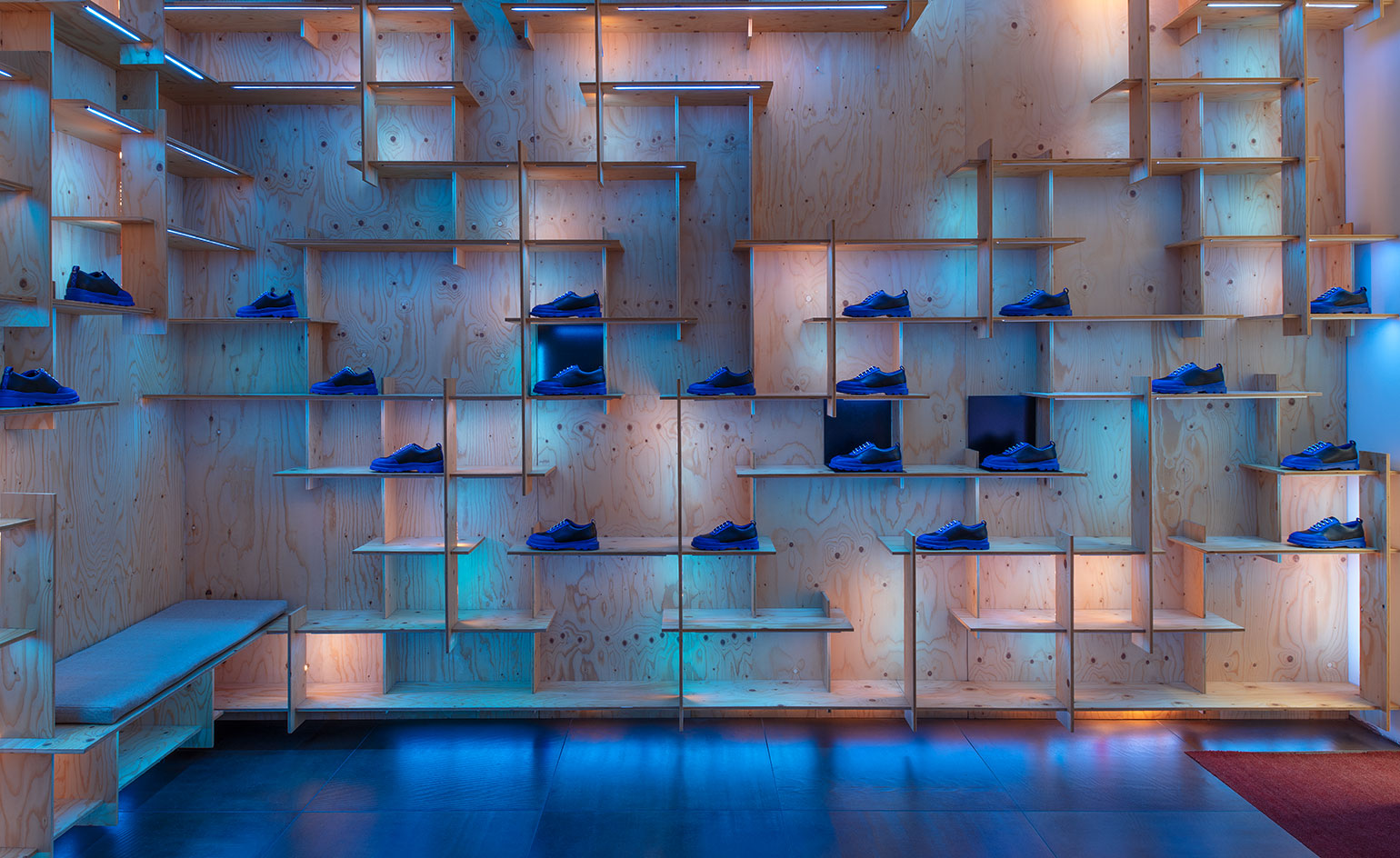
Camper Shoes
Camper: ‘It is a very comfortable shoe,’ Spanish artist Coco Capitán tells Wallpaper* in the blue glow of her sea-themed installation at Camper’s Via Montenapoleone store. In the window, a screen of water stands bubbling away, the rain outside adding a second layer of moisture to proceedings. ‘I wanted you to be able to see the shoes through the water,’ she explains. And that you can. Her take on the Brutus shoe - a black and blue version with rope-inspired laces - line the walls, which are lit up in (you guessed it) blue lights. ‘I like things to be quite simple and speak for themselves,’ she says.
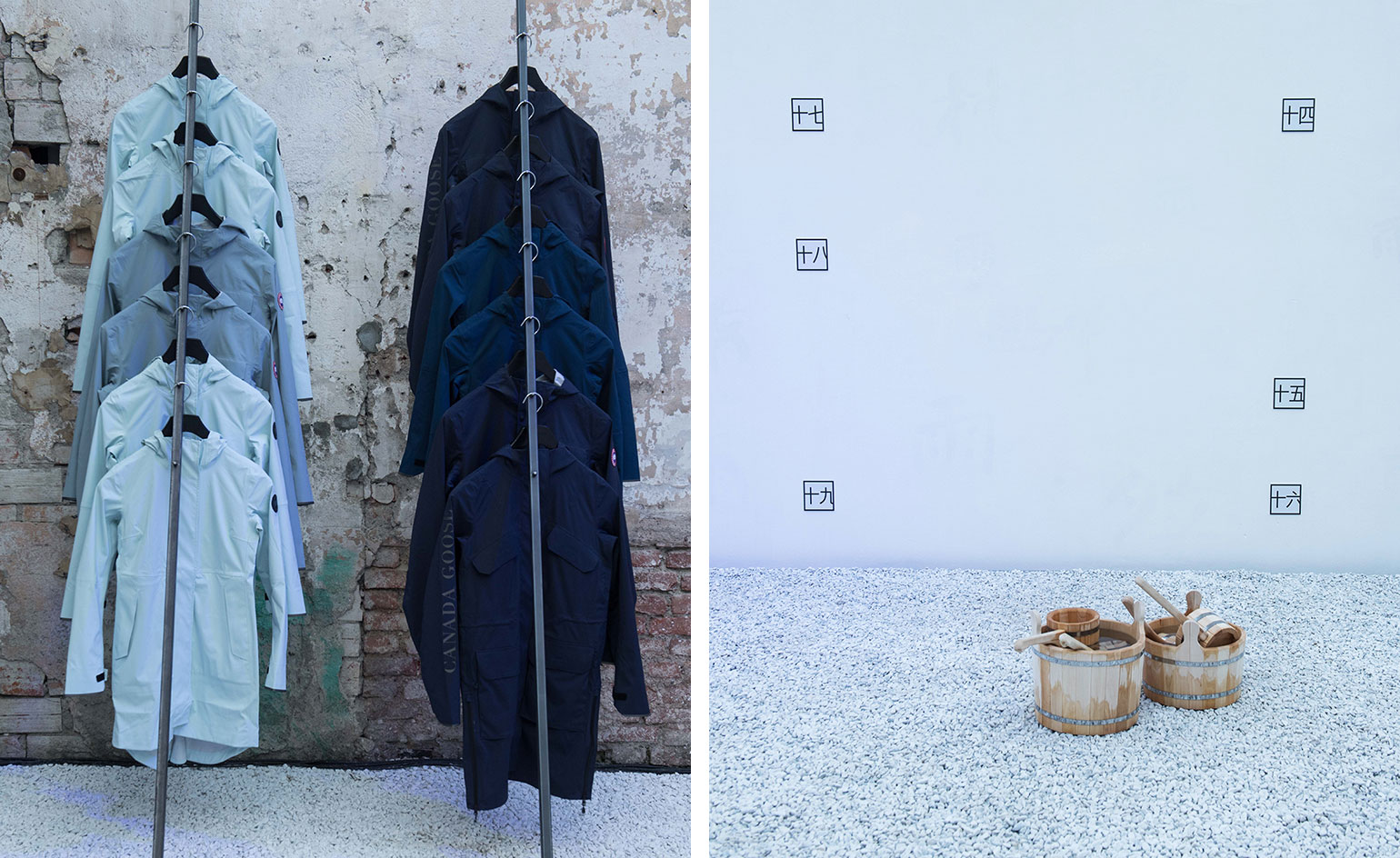
Canada Goose immersive installation
Canada Goose: ‘I want visitors to experience sprinkles of words and sounds of the rain,’ says product and sound designer Kouichi Okamoto of his immersive installation, 50 Words for Rain, hosted at the Via Savona brand’s outpost. ‘I want everyone to have their own individual experience, discovering the words, listening to the rain and feeling the joy of exploring rain in an accidental way.’ It is a fitting celebration to launch the brand’s Nomad capsule collection, which combines two unique fabrics - Gore-Tex Shakedry and Infinium - to protect you against the elements, regardless of what word you may use to refer to the rain.
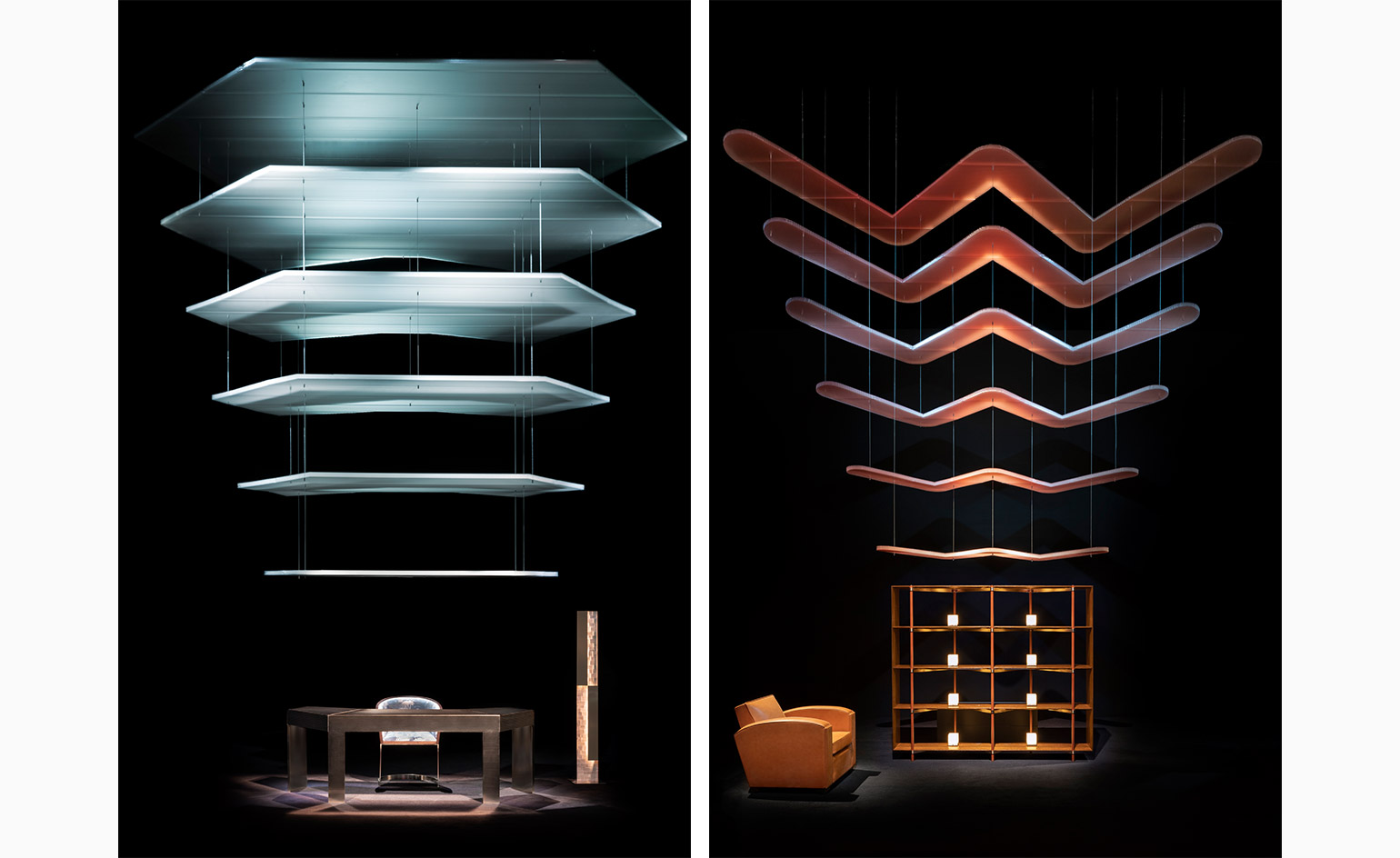
Emporio Armani Casa
Armani/Casa: In February, Emporio Armani reopened its Caffè & Ristorante in Milan, a space swathed in grey stone, lacquered wood and pale god fixtures. For Salone del Mobile, the brand transformed its Armani/Casa flagship store on Corso Venezia and presented a new range of décor elements. Its Wallcoverings collection features a renewed partnership with Jannelli&Volpi, and boasts an aesthetic meander through some of Giorgio Armani’s favourite Italian islands. The brand also debuted new fixtures for the bathroom (Armani/Roca) and home (Armani/Dada), including a range of countertop basins, cupboards in brushed oak and a champagne-finish ribbed steel, plus a bronze metal iteration of its signature Slide kitchen.
Rosa Bertoli was born in Udine, Italy, and now lives in London. Since 2014, she has been the Design Editor of Wallpaper*, where she oversees design content for the print and online editions, as well as special editorial projects. Through her role at Wallpaper*, she has written extensively about all areas of design. Rosa has been speaker and moderator for various design talks and conferences including London Craft Week, Maison & Objet, The Italian Cultural Institute (London), Clippings, Zaha Hadid Design, Kartell and Frieze Art Fair. Rosa has been on judging panels for the Chart Architecture Award, the Dutch Design Awards and the DesignGuild Marks. She has written for numerous English and Italian language publications, and worked as a content and communication consultant for fashion and design brands.